#As the nation went through tragic events this month
Explore tagged Tumblr posts
Text
Ultimate Genshin Tournament: Round 5
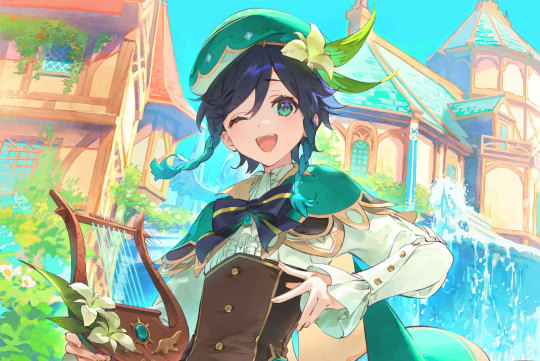
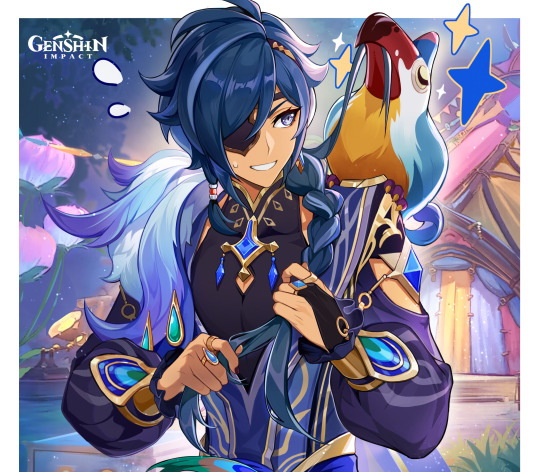
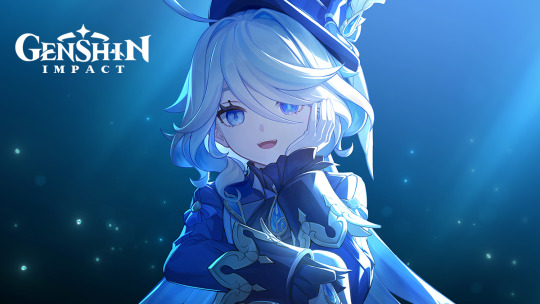
Propaganda below cut
Venti:
calls the Traveler "his warrior" plus he's like our long-time friend??? He basically asked us out during the alchemy event???? You can choose to bring him up during the fight with Signora????? He's the best idc
He. Is. Amazing. So many layers, so interesting...So much trauma and potential...Not to mention look how AWESOME he is generally!!! He's kind and caring towards everybody, and also carefree and mischievous!!! How can you not love him??
he’s TOO GOOD for this world- he’s just a little guy!! Like he cares for his nation and the people of Mondstadt SO MUCH it hurts when people say he doesn’t. Like, my poor trauma-driven little mega-powerful war god who’s actually just a tiny little wind spirit honoring his dead friend!!!! I love him so much
his lore means he gets brought up almost every patch. he convinced a bunch of the most lethal women in Teyvat to have tea instead of screwing him up. he would always rather take the path of least resistance. he’s the three time best bard in Mond. he never seeks glory, only wishes to offer it to others. he was a better father to Diona than her real one five minutes into meeting her. he gives Glory whispers of what the world looks like so she can navigate. when a nun of his own church denied his identity he decided to run a heist to steal back an item that is only holy because it is his. he keeps his misery and loneliness trapped within, and does his best to bring joy to every person he meets. how can you not love him?
He's Venti. How do you beat that? Answer: you don't. You can't.
they say that an nation is most like their archon but is the anemo archon a god that took after the people's traits or did the people take their archons traits (the only correct answer is that venti took after old mond's people traits and it's so disgustingly sweet, he's a lil baby who cared so much that he kept old mond's wishes heard and their dream a reality — of freedom (without a god, as much as he could) where humanity leads trust. he left mondstadt because he trusted that humanity would do that right thing always but then he got betrayed by the Lawrence clan but he forgave them???! the anemo archon gave them no punishment , but mondstadt did . venti has me ugly crying
Kaeya:
He's cool, he's mysterious, he wears an eyepatch, he has a super tragic backstory, he's good with kids, he takes care of his friends, what's not to love!!!
despite all the hardships he’s suffered, he’s still such a kind person
This is the character of the everyman. Everyone should love Kaeya because he's with you no matter what. He has the great mystery of his origins and his damage with his family and his brother, but he is with you til the end. That's what makes him so special to me
Furina:
girl deserves therapy and hugs and the best life in the WORLD because oh boy she went through a lot!!!! wouldn't pretending to be a god for 500 years with no support mess you up? and yet she still kept on going for her people!! she wanted to save her nation from a doomsday prophecy and she DID
After act 5 she deserves the world :(
“If all the people of Fontaine are on one side, and I am on the other…is it not obvious where the scales of suffering should tilt?” NO IT ISNT YOU’RE JUST ABNORMALLY SELFLESS AND INCREDIBLE AND PERSISTENT. Even the Archons praise Furina’s name and say she is a human with strength and capability worthy of an Archon. That’s not even to speak of Focalors. She snapped at Arlecchino only when the Harbinger implied that Furina had done nothing to preserve her people from the flood. Meanwhile every minute she was working to prevent the prophecy. A month after we took her to court and almost got her killed she agreed to help us direct a play, a favor for a favor
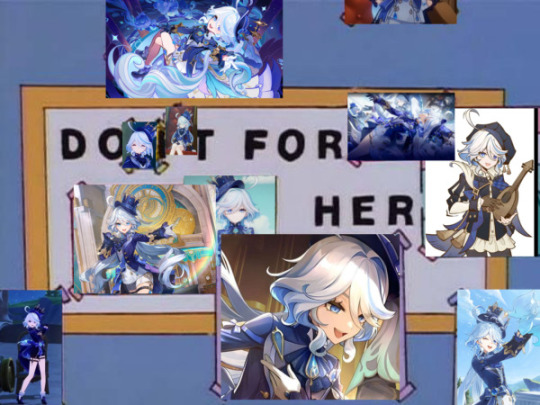
#original tournament#ugt poll#ugt round 5#ultimate genshin tournament#genshin impact#genshin#tournament#character tournament#tumblr tournament#bracket tournament#tournament poll#genshin polls#genshin venti#kaeya alberich#genshin kaeya#genshin impact kaeya#furina#reblog for sample size etc etc#has propaganda
116 notes
·
View notes
Note
Didn't The Ray has a sidekick for a while in the fifties? Spitfire or something like that? Whatever happened to him?
Yes that's a rather tragic tale that one and a story that highlights the dangers that come with superhuman abilities no matter who your parents are.

(A photograph from the Philadelphia Inquirer showing Spitfire's temporary rampage through the city.) Joshua Terrill was born to the first Ray, Langford "Happy" Terrill and his first wife Rachael in the late 1940s with genetic abilities inherited from his father. The ability to direct, absorb and control photons of visible light. His abilities were even stronger than his father's, able to take on a fully intangible form. He was unveiled to the world as the Ray's sidekick Spitfire for a few months around the passing of the Keane Act. The Keane Act making their actions rife with hostile encounters with police and the public revealed Joshua's burgeoning mental instability, a violent instinct in the boy that was only more damaging because of the destructive potential of his abilities. During an argument with his mother, the young Joshua lost control, turning his abilities on her to fatal results. Naturally horrified by his son's actions, the elder Ray restrained his son and placed him in cryogenic status until a time where the interaction between his mental illness and his powers could be better treated, especially with government hostility against publically active superhumans being at an all time high. This personal tragedy is what lead the Ray to abandon our reality and join the expedition of the Freedom Fighters that set off to liberate the Nazi dominated Earth-X. It wasn't until the second and current Ray uncovered the still slumbering Joshua that much of this information came to light, as the awakened Spitfire went on a nearly fatal rampage across Philadelphia. Eventually both Rays were able to bring the young man under control (leading to a rather heartbreaking scene of young Joshua breaking down sobbing and begging his father for help while wrapped around his ankles. It really is watching a snarling supervillain turn into a scared 10 year old in the blink of an eye) The boy has, very rightly, been kept away from the public eye since then under the care of the Ray and his second wife Nadine. He is enrolled in STAR Labs' superhuman psychology unit through their Philadelphia branch where one can assume he is undergoing intensive therapy not only for his native mental disquiet but also the trauma of the events he has been through. He has been at the center of the so called "Killer Kids" 'movement' when a national forum of 'concerned' parents and other authorities figures attacked programs like STAR Labs for offering these kinds of rehabilitation programs to "metahuman delinquents" rather than placing them in a juvenile detention facility or, as many in the movement prefer, stating that the possession of metahuman abilities automatically should force one to be tried as an adult. My thoughts on such a "movement" are simplistic and can usually be communicated in a series of very impolite four letter words at very high volume. Especially when the apex of this movement's popularity escalated to protests and threats being made toward or around the Terrills' Philadelphia home. Which I'm sure only further exacerbated Joshua's mental distress. The movement has died down into the realm of vague conspiracy theories (though the movement endorsed Lex Luthor for president *cough cough*) and as far as is publically known Joshua continues his recovery in private, surrounded by trusted professionals and family. I will reiterate my personal and professional stance that the Terrills are owed their privacy and that any public speculation of Joshua's current condition is just that, speculation and I condemn any attempt to invade or interrupt the boy's life for our public knowledge, curiosity or "judgement"
#dc#dcu#dc comics#dc universe#superhero#comics#tw unreality#unreality#unreality blog#ask game#ask blog#asks open#please interact#worldbuilding#ray#ray terrill#happy terrill#spitfire#joshua terrill
36 notes
·
View notes
Text
May 2024 Important Dates

AKA my notes from The Astrology Podcast's May Forecast.
April recap: on the 8th we had the solar eclipse in Aries that covered much of the United States, during a Mercury retrograde and right before a Mars-Saturn conjunction--all also in Aries! In international news this connects to Iran's retaliation for Israel's strike on its Syrian embassy. A tragic eclipse story is of astrologer Danielle Ayoka, whose death after a mental breakdown was sensationalized by the LA times as part of modern-day Satanic Panic. Our hosts urge the wider astrological community to learn more about how to support others who may be going through a mental health crisis and extend sympathy to the affected families. The inflammatory reporting also connects to a larger story of backlash against astrology as Saturn approaches a conjunction with Neptune in Pisces and the latter leaves the sign.
On April 10th we had an exact Mars-Saturn conjunction in Pisces, which a previous forecast predicted would correspond with issues of contaminated water, maritime warfare, and flooding. On the day of the conjunction, the EPA issued the first national limit for forever chemicals in the water. Saturn signifies both the restrictions and the longevity of the chemicals. There was also torrential flooding in Dubai, Russia, and Kazakhstan.
Jupiter conjoined Uranus in Taurus on April 20th; these planets only align every 14 years. Jupiter-Uranus indicates uprisings and revolutions: the last one corresponded with the Arab Spring, and there was also one in 1968-70 during Vietnam War protests, as well as the French and American revolutions. The student protests at Columbia (and later other universities) calling for divestment and ceasefire in Gaza are a direct connection here (the current encampment was directly inspired by student protestors doing the same thing in 1968 to protest the Vietnam War). These protests began on April 17th and saw a boom in media coverage when the conjunction went exact. The 1969 conjunction was in Libra; in Venus-ruled signs this alignment signals uprisings of "we don't want to be at war!" If these protests did start right at dawn on the 17th, this would have the Jupiter-Uranus conjunction (already exact by degree, but not minute) rising, fitting for an action that has sparked events across the nation.
Another Jupiter-Uranus story includes Congress passing a bill wrapping together military funding for Ukraine, Israel, and Taiwan with a probable TikTok ban. A historical connection here is the passing of the Lend-Lease bill in 1941, a precursor to the US entering WW2. With the US Uranus return coming up (which corresponds to the Civil War and WW2), Chris is nervous. Other conjunction stories include the restoration of net neutrality on April 25th (Taurus ruling basic necessities and resources), the Department of Transportation mandating airlines to give refunds (the Wright Brothers flew under a Jupiter-Uranus conjunction), the FTC put a ban on employer non-compete agreements, and a VW factory in Tennessee successfully unionized as part of UAW--one of the first unionized auto factories in the South! These regulation stories also fit with Saturn bringing rules and regulations.
We're entering the month of May right as Mars enters his domicile Aries, freeing us of the Saturn conjunction, Mercury stationing direct, and Venus in her home sign of Taurus.
May 2nd - Pluto stations Retrograde This occurs at 2 degrees of Aquarius and will see Pluto backtrack into Capricorn for the final time this summer. Retrograde stations intensify the significations of a particular planet in that sign, and this particular one occurs with a square from Venus in Taurus and copresence with the Moon. Pluto in Aquarius developments include developments in AI & technology, and with Venus signifying the arts we can expect AI image/video developments. On a personal level Venus-Pluto can indicate deep, transformative relationships as well as control, manipulation, and power dynamics. Venus in Taurus also activates the Jupiter-Uranus conjunction, especially in the realm of our relationship to the natural world & differentiating what is real from what is fake. On a more positive note, this is a good time to indulge in creative projects, and with a retrograde especially, returning your idea to its original state. Venus-Pluto also relates to issues of women's rights and bodily autonomy (ex. Roe v. Wade).
May 7th - New Moon in Taurus

At 18 degrees of Taurus, the New Moon forms a sextile to Saturn (17♓), and soon approaches the Jupiter-Uranus conjunction (orb 3) just a few degrees away. Jupiter-Uranus themes will become more pronounced collectively and in our personal lives, likely bringing new chapters in the stories discussed in the recap. Also in Taurus is Venus, who's slowing down after her zip through Aries and emphasizes relationships as she brings us back down to earth. Meanwhile, Mars in Aries doesn't make many aspects to other planets this month (even copresent Mercury is moving away from him), making him a bit of a renegade, but also not interfering with other planets. On the 25th Mars will reach the degree of the eclipse (18♈), so those affected by the eclipse, especially night charts, will definitely see extra focus in this part of their lives, while day charts can expect some challenges.
May 12th/13th - Sun conjoins Uranus (not pictured) This Taurus season sees the Jupiter-Uranus conjunction continually activated. Rather than the usual relaxation, we'll hear the bells of rebellion tolling over and over. (Another date to watch is May 18th, when the Sun hits Jupiter.)
May 13th - Mercury enters Taurus He exits his retrograde shadow before this ingress and at the same time Venus sextiles Saturn, clarifying conversations. We'll feel like we're finally done with some hassles. Mercury's ingress into Taurus also focuses the solid majority of our energy in this area, rather than splitting it with Aries. However, he squares Pluto immediately upon entering, so before smooth sailing we'll have to deal with intense focus, digging up the past, and uncovering secrets. This might deepen conversations as Mercury treats the same issues Venus brought up with her square to Pluto earlier this month, but now with more distance and calculation than the tender emotions, or it can amplify those issues with a microphone.
May 14th - Electional chart for the month (not pictured)

May is actually one of the best months for electional astrology all year, free of Mars retrograde and most outer planet tensions that will overshadow the later part of the year. This selection is for about 12:30PM local time. This should give Leo rising, and the Ascendant ruler the Sun is in Taurus within 3 degrees of a conjunction to Jupiter in the 10th house. Venus is also in Taurus, squaring a Leo Moon in the first house. This is a great chart for 10th house matters like career, reputation, and public image, with the Ascendant ruler fully bonified by Jupiter and supported by both benefics. With the first house connection Diana suggests this is also a good time to update your work wardrobe or possibly website in ways that may seem unexpected. It's a good time to do something unique or innovative with Uranus placed so prominently. It's not as good for ninth house matters like foreign travel, as Mars is there in a day chart.
May 18th - Venus conjunct Uranus, Sun conjunct Jupiter Venus conjoins Uranus (23♉) at the same time that the Sun conjoins Jupiter (28♉), bringing us optimism and excitement. It's extremely buoyant and can be disruptive simply by virtue of so much happening at once. It's a Saturday, so a great time to have fun, but be prepared to sleep in late the next day. We can find new relationships that begin quickly but burn out fast too, and run into unexpected good luck.
May 19th/20th - Mars conjoins North Node (not pictured) The next day the Moon enters Libra and opposes this configuration, activating it. Mars takes the place of the Sun in an eclipse, reactivating the stories that these Aries-Libra eclipses have been pinging in our lives. Mars's anger may be in response to people crossing our social boundaries represented by the Moon in Libra. With the Moon bringing in the South Node and Mars's severing associations, we may become aware of things we need to relinquish or cut off. Picking fights can lead to consequences you really don't want.
May 20th - Sun enters Gemini This ingress foreshadows the stellium of planets in Taurus shifting to Gemini.
May 23rd - Full Moon in Sagittarius, Venus conjunct Jupiter, Jupiter sextile Neptune, Venus enters Gemini
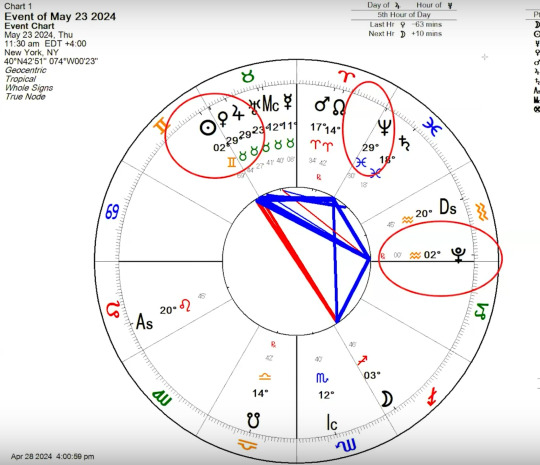
This Full Moon is opposite the Venus-Jupiter conjunction (29♉), both of whom sextile Neptune (29♓), and when the Moon exactly opposes the Sun it sextiles Pluto. This is a more positive and optimistic lunation than what we've been seeing so far: the best of the night sect with the best of the day sect. Agreements made during this time will have staying power, and it's a good sign for peace in world events. Neptune connotes idealism in these accords--sometimes you need ungrounded hopes and dreams to go on. Venus-Jupiter conjunctions can also bring too much of a good thing, so be careful not to overindulge. This is also a good time to enjoy material and sensual comforts. It's the perfect day for a picnic!
Venus joins the Sun in Gemini soon after.
May 25th - Jupiter enters Gemini Jupiter spends about a year in a sign, and we'll be shifting from slow, grounded Taurus to mutable, airy Gemini. He'll be trining Pluto in Aquarius while here, accelerating technological advancements like AI and innovations in transportation. Diana uses the image of lots of busy bumblebees trying to collect lots of different information very rapidly. It might be overwhelming, and we could see heightened allergens. This also sets up the next month, where we'll have lots of activity in Gemini...all of which will square Saturn in Pisces! It'll be a lively air and water show with changes in short-term travel. In our personal lives, the combination of Venus & Jupiter will alleviate some of the issues we've been feeling in mutable signs, where places we've felt weighed down and restricted will receive some levity and buoyancy. Whichever house Gemini occupies in your chart will see some smooth sailing for awhile. Use this positive support in Taurus and Gemini to make hay while the sun shines!
May 31st - Mercury conjunct Uranus Mercury is the last planet to ping Jupiter-Uranus conjunction; in general there is a lot of planetary activity in Taurus this month, really activating whichever house that falls in for individuals. Mercury brings a megaphone to the final blast of energy from Taurus. Surprising news, unexpected communications, and conversations with unlikely sources are in order. Uranus-Mercury can open up possibilities that you never could have predicted, and are good for thinking on your feet. Both planets are associated with the nervous system--it's a good day to be cautious with your caffeine consumption.
Whether you need to be active or just rest, take advantage of the stability and help this month!
#astrology#transits#forecast#may 2024#pluto retrograde#mars in aries#jupiter conjunct uranus#jupiter in taurus#jupiter in gemini#venus in taurus#venus conjunct jupiter#venus conjunct uranus#sun conjunct jupiter#mercury conjunct uranus#venus square pluto#mercury square pluto
27 notes
·
View notes
Note
I'M SORRY IF THIS IS TOO MUCH but please have these!!
🎮 VIDEO GAME CONTROLLER /💤 SLEEPING SIGN / 🚫 PROHIBITED /🍃 LEAVES FLUTTERING IN WIND /❤️ RED HEART /😊 SMILING FACE WITH SMILING EYES /😓 DOWNCAST FACE WITH SWEAT
OMG IT'S NOT TOO MUCH!!!!!!!!! thank you!!! anyway i'm gonna start yapping
🎮 VIDEO GAME CONTROLLER — what are three of your oc's favorite hobbies?
She cuts up fashion magazines and tapes the clippings to the inside of her closet door, calling it her “vision board.” Officially, it's for building her “aesthetic archive,” but in reality, it’s mostly an excuse to justify the chaotic outfit choices she puts together. They’re definitely questionable, and while she might suspect it, she won’t appreciate you saying it out loud.
As a kid, she used to host elaborate soap operas starring her dolls, which, to be clear, were mostly a mildly cursed collection of thrift store finds her mother gave her, plus one slightly tragic rabbit plushie. When she said two dolls were going to “get married,” what she actually meant was that they’d hold a two-minute wedding before launching into a plot involving betrayal, poisoning, political scheming, and at least one purposeful limb loss. She could recreate five seasons of Succession using Barbies and a shoebox, it's equal parts impressive and deeply unsettling.
She also enjoys calligraphy. She even bought a fancy pen for it and made a Pinterest board titled “calligraphy vibes.” Unfortunately, she never actually has time to practice.
💤 SLEEPING SIGN — is your oc a light sleeper or a heavy sleeper? how are their sleeping habits?
She’s a light sleeper. There’s a line from dog’s dinner that captures the reason behind it: “Momo doesn’t sleep around people because sleep is a surrender, and surrender is how you die. Those voices, soft in the daylight, can twist in the dark. She remembers the sound of breaking glass like a lullaby, the weight of a body too close, the breath of something that should have been safe but wasn’t.” And while "Momo's" internal voice often leans toward the theatrical, this part is entirely sincere. Yekaterina’s fear has no embellishment, and it resurfaces even in Momo. Her early childhood in Japan was quiet and sheltered, spent mostly at her mama's side. But as she grew older, that sense of safety began to erode. By the time she entered adolescence, she had already experienced violations no child should ever face, particularly from men who recognized her vulnerability and chose to exploit it.
Her sleep schedule today reflects that history. She keeps to eight hours a day, technically, but they usually fall between 8 a.m. and 4 p.m.. Because she works night shifts, she often misses daylight entirely during the winter months. There are no bedtime rituals, no tea, no calming routines, no medication.
🚫 PROHIBITED — does your oc drink/smoke? do they do it regularly, or is it more on occasion or for special events?
She’s been smoking since she was 13, snatching Irina’s cigarettes during that period when Irina was way too busy to keep tabs on her child, like genuinely too stressed to notice anything besides the next deadline and her own nicotine withdrawals. Irina was going through two packs a day, so when half a dozen cigarettes mysteriously vanished, she just assumed she had a rough day and chain-smoked through it.
Now Yekaterina has the classic morning ritual of coffee and a cigarette, the smoking breaks, time outs, all the rituals that smoking pretends to bring. She drinks on her job tbh and sometimes she just drinks herself to sleep. (why heal your inner self when you can do that hm)
🍃 LEAVES FLUTTERING IN WIND — what is/was your oc's favorite subject in school?
I'm gonna yap btw, because I overanalysed the Japanese system school for this fic (mostly because I went through a whole different system and I need to know what the fuck I'm talking about haha) In school, Yekaterina’s favorite subject was Ethics-Civics, which is a legit part of the national curriculum, especially in elementary but sometimes during high school too. The subject focuses on teaching values like empathy, respect, responsibility, and the concept of kokoro (like heart/spirit), as well as how to function harmoniously in society. Yekaterina, being an outsider in a very rule-following culture, started off side-eyeing this class like it was propaganda, but then she realized it wasn’t about being good in the obedient sense, it was about asking the big questions: Why do people lie? What does fairness actually mean? What’s the right thing to do when nobody’s watching? She aced at it because she was fascinated by the human condition (still is) She also liked Modern Literature in uni because she wanted to understand the country that shaped her and ignored her. Literature gave her an honest mirror.
❤️ RED HEART �� what are three of your oc's positive traits?
Unshakable loyalty (but like, in her own cryptic way), which is the part of her I want to hover on in 'voodoo dolly', because her POV is extremely unreliable and Yekaterina doesn't really see it that way, but people around her might perceive it.
She has endured immense hardship in pursuit of a better life, so this woman is resilient. Despite the morally murky choices she’s made, she keeps pushing forward, adapting quickly to the shifting power dynamics around her.
Her adaptability is scary tbh, she can think on her feet, change tactics, and slip into any role, but she has no fixed self. That kind of mutability is the evolution that helped her survive the Borderlands.
😊 SMILING FACE WITH SMILING EYES — what are your oc's career/general life desires? what do they want to get the most out of life?
Her whole plan was to work in international relations or something like that, embassies, translation for high-level diplomacy. A good job, serious enough to make her mama proud, but Japan’s job market is brutal for foreigners, especially women (in MY Japan that I personally searched on the internet, I can't really know how things work there fr) After a while, trying different odd jobs y'know, she just needed more money because she was taught that mantra MORE, MORE, MORE, MORE YOU NEED MORE, YOU CAN'T POSSIBLY ENJOY BEING A CASHIER, A BARISTA, A SHOE SELLER IN A MALL??? and the last resort she took to fulfill that is all in my fic haha :(
She really wants to belong to no one and move without being questioned, just freedom of motion and identity.
😓 DOWNCAST FACE WITH SWEAT — is your oc open-minded or stubborn? are they inquisitive or do they prefer to keep to their bubble of knowledge?
She’s not open-minded, she just makes it look like she is. She'll entertain any idea if it helps her survive, but the moment something threatens her worldview, byeeeeeeeee. She’s inquisitive, yes, but selectively so. She doesn’t need to know everything, only what gives her leverage.
4 notes
·
View notes
Text
I feel like if 9/11 happened again, no one would really react.
I think a lot of people were horrified on 9/11 because they didn’t know things like that happened. The boomer generation is all like “never forget”, acting like it’s the greatest tragedy since the Holocaust, and acts like joking about 9/11 is paramount to joking about genocides, but they went to school every day to learn about how to hide from a nuclear bomb.
At the end of the day though, the most that 9/11 effected the lives of most people acting like 9/11 is the world’s greatest modern tragedy is that they have to take their shoes off at the airport. 9/11 had disastrous effects, of course, but not on the people most intimately obsessed with its tragedy.
There’s a 2002 episode of Arthur where a school fire is used as an analogue for 9/11. (I really wish they just used real 9/11 that would have been so fucking funny) One of the plots is about Buster feeling bad about not really caring about the fire. At the time that was a super important message for kids, because why the fuck would they care? They probably don’t even know how much 3,000 is or necessarily what death is or maybe even where New York is. It’s unrelated to them.
9/11 happened 21 years ago. It can legally drink in the US. If you actually remember the significance of what 9/11 was when it happened, you’re kind of old now. Young people either were Buster or they learned about 9/11 in history class. It’s a meme now.
I’m going to New York in about a month and I’ve already planned to take a photo of the 9/11 memorial and caption it “I forgor”. I don’t fucking care; I wasn’t alive in 2001. I think older people need to accept that 9/11 is now a historical event rather than a modern tragedy, and a historical event with a comparatively low body count.
The fact that 9/11 gripped the nation for decades after isn’t just a consequence of the place and time it happened; it was intentional. It was a terrorist attack; it was meant to be flashy, it was meant to be destructive, and it was meant to be scary. Making 9/11 out to be the worst thing ever projects Al-Qaeda’s strength.
We’ve now lived through entire months in which every day has killed more people than 9/11. Of course that’s always been true, but not from one collective, abnormal cause. When you become desensitized to death, it’s no longer tragic. One death is a tragedy, a million is a statistic.
The constant propaganda about 9/11 being the worst thing ever, counterintuitively, makes it seem less bad. It normalizes it to the point that it’s not the tragedy it once was. Especially when you didn’t live it because you were not yet alive.
This doesn’t necessarily have to be a bad thing, I mean no one cares about the myriad obscure genocides which killed hundreds of thousands to millions, but 3,000 people who happened to have a statistically higher income (the Twin Towers housed financial offices and the flights that were hijacked tend to have a lot of business travelers, especially on a morning flight early in the week)? Greatest American tragedy literally ever.
I think people not caring about the faceless people who died on 9/11 and ended up getting turned in to patriotic martyrs and caring more about the faceless people who die every day because governments around the world think it’s in their best interests for them to is a good thing. It’s an inevitable part of moving forward in time; the sands of time erode all but the number of bones.
So joke about 9/11. It ends the era of “never forget”, and brings about that of the perpetual apathy that faces all historical events with the inevitable bored child in an elementary school classroom asking the teacher why he should care about dead people.
13 notes
·
View notes
Text
Maternal care and legal protections are incomplete if they don't include care and career protections after pregnancy loss or stillbirth.
Data from ONS shows women who suffer stillbirths are worst hit in employment earning terms
By Karl Matchett Monday 16 June 2025 12:00 BST
Women lose up to £14,000 in earnings and are less likely to secure employment after suffering a miscarriage or stillbirth, a shocking new study shows.
Data released by the Office for National Statistics shows women suffered lower average earnings for up to five years after losing a child during pregnancy or labour.
The study looked at the monthly pay and employment status of women who went through stillbirths, neonatal deaths, miscarriages, ectopic pregnancies and molar pregnancies.
In total, losses of up to £13,581 were shown across at least a five-year period. The probability of employment also reduced by a maximum of 4.8 per cent in the three months following the end of a pregnancy. Those who had suffered a stillbirth saw a drop in likelihood of employment for up to two years afterwards.
Joeli Brearley, founder of the charity Pregnant Then Screwed, said: “From the point that women become pregnant they are judged as less capable of doing their job. Even if they then tragically experience pregnancy loss or still birth, the bias still lingers, impacting their progression and earnings.
“These women are facing every mother's worst nightmare, and the trauma is compounded by ongoing bias which says they must be distracted and less committed to their job.”
She added that very few women receive support from their employer during this period, according to previous research carried out by the campaign group.
“What world do we live in that penalises a mother professionally at a time of loss so great that most of us can't even bear to imagine it?
“It is very encouraging to see the ONS is looking into this, and we would like to see more done to protect and support mothers when they are at their most vulnerable from not being held back in their careers too.”
Emma Sharland, principal officer of ONS’s health research group said: “These events can have a devastating emotional and health impact to women who experience them and their families. For the first time, we have looked to understand the financial impact they can also have.
“We found all these events caused a decrease in earnings, with some leading to a total loss of almost £14,000 in earnings over five years. This financial impact persisted, and those who experienced some of these events never saw their pay recover during the study period."
The ONS study, which covered 2014 to 2022, found that the loss of earnings was likely caused by changes to employment status and to pay because of women moving to part-time work or different type of employment.
Almost 150,000 women aged between 23 and 60 were included in the study. The data includes women who are employed rather than self-employed.
1 note
·
View note
Text
"God is Our Refuge and Strength"
John Sawyer
Bedford Presbyterian Church
6 / 15 / 25 – Summer Sermon Series[1]
Psalm 46
“God is Our Refuge and Strength”
(Words to Live By)
This summer, we are exploring a series of scripture passages that have been requested and suggested by members of this congregation. This list of readings that many of you have provided is not an exhaustive list, by any means, or even a list of “Greatest Hits,” but it does kind of paint a picture of who we are as a church, theologically speaking. What are the scriptural and spiritual themes of our lives that have helped to shape the way that we see God and the world and our place in all of it.
Today’s scripture was suggested by two different people – people who are not unacquainted hardship and grief, but people whose personal faith are an inspiration to many. Both of them suggested words from Psalm 46 and when I saw that they had picked Psalm 46, I was excited, because I find these words to be especially meaningful to me, too. I can trace their significance all the way back to the beginning of my ministry in the church.
Before I graduated from seminary in May of 2001, a friend and I took the train from New Jersey into New York City and we went to the Statue of Liberty – climbing all the way into the crown. On the way to catch the train back to New Jersey, we walked through the big, open plaza between the World Trade Center towers – past a large bronze sphere in the middle of a fountain. It was a beautiful, sunny, afternoon and all seemed right with the world.
A week or two later, I graduated, and a few months after that, in August of 2001, I started my first church job in Charlotte, North Carolina – working as a youth director and Christian educator. I began, knowing that – in the beginning of September – the pastor and a large group of church members would be out of town on a Caribbean cruise. Around 9 AM on the morning of September 11, Donna the church secretary, came into my office to say that she had just heard something on the radio about an accident in New York. We turned on a TV and saw the unforgettable images of the World Trade Center towers on fire. We watched – horrified – as they collapsed.
Pretty soon, the phone at the church started ringing. Were we going to have some kind of gathering for prayer? I made the suggestion that we gather at 12 Noon in the church sanctuary. And, as a newly-minted seminary graduate, full of all of the wisdom and experience of three weeks – twenty-one days – on the job, I started to wonder what on earth I could say to bring comfort in such a horrific moment in the life of our nation and the world.
Suddenly, it came to me – a song that I had sung in church choir, years before:
God is our refuge and strength, A present help in time of trouble. Though the mountains shake in the heart of the sea, Though the waters roar and foam, We will not fear.[2]
Yes, I know the music was a little too peppy for a tragic event like September 11, but the words were what mattered. Besides, however the words get planted in our minds – however the words get written on our hearts – when it counts, it is the words that matter. It is God’s Word that matters.
In the history of God’s people – throughout the words of scripture – there are all these reminders to take, and hear, and read, and remember the Word of God. In the Book of Jeremiah, God says that God will make a new covenant – a new relationship – with God’s own people, saying, “I will put my law within them, and I will write it on their hearts; and I will be their God, and they shall be my people.” (Jeremiah 31:33)
In the Book of Deuteronomy, God’s people are reminded,
“You shall love the Lord your God with all your heart, and with all your soul, and with all your might. Keep these words that I am commanding you today in your heart. Recite them to your children and talk about them when you are at home and when you are away, when you lie down and when you rise. Bind them as a sign on your hand, fix them as an emblem on your forehead, and write them on the doorposts of your house and on your gates.” (Deuteronomy 6:5-9)[3]
Sometimes, you might see a very traditional Jewish person with straps literally wrapped around their arm and forehead – straps inscribed with the commandment to love the Lord.
A great scholar of the Old Testament, Walter Brueggemann, who died just last week, once wrote that these instructions to recite the words and post them and wrap them around yourself are a “pedagogy of saturation”[4] – teaching these words by surrounding your every waking moment with them and absorbing them, almost by osmosis. . . until they take up residence in your mind and are written on your heart.
And so, on September 11, even though I had never wrapped the words of Psalm 46 around my arm or hand, in a moment of crisis, the words, “God is our refuge and strength. . .” came to my troubled mind – as if pulled from some mental and spiritual rolodex – and spoke to my fearful heart. You see, if we surround ourselves with enough of something, it has a way of sinking in, taking up residence, and staying. It does beg the question in this age of constant bombardment by different forms of media, what are we surrounding ourselves with? What words, what attitudes, what beliefs and values are you and I ingesting? What is sinking in and taking up residence in our hearts and souls? And is all of it good for us – for our mental and spiritual well-being? I would contend that not all of it is.
And yet, if there is a word of hope, a word of faith, a word that gives us the courage to keep going, despite all odds, that somehow gets written on our hearts, I don’t believe this is a bad thing. I believe that Psalm 46 is one of the best examples of this in all of scripture. . .
The Psalm begins with a bold statement – a theme that carries throughout: “God is our refuge and strength.” (Psalm 46:1) Not material things, not other human beings, not governments or human systems, or technology. . . No. . . God is our refuge and strength. There might be times when we find comfort in material things, or other people, or systems that help our lives. But when it comes to who and what is our true refuge and who and what grants us true strength, God is theonly answer. And it’s not just God who is the answer, it is God’s presence that is “. . . a very present help in trouble.” (46:1)
Have you ever been in trouble, yourself, or lived through troubling times and events? Where and how did you find the help you needed in the moment?
In today’s passage, the Psalmist is singing a song about cataclysmic events – natural disasters, great upheaval, wars between nations – and how through it all, God is our true refuge and strength because God is with us. There is even a refrain that is repeated twice in the Psalm: “The Lord of hosts is with us; the God of Jacob is our refuge.” (46:7, 11)
This does not mean that there won’t be times when we wonder whether God is with us or not. There have been plenty of times in my own life (and in the lives of people that I have known) in which the big question is, “Are you there, God?” This past week, someone in this very room told me that they were having a hard time connecting with God in the wake of a horrific tragedy. But sometimes, the very act of wondering – wrestling – in this way is a sign that God is with us, at work within our hearts, stirring us to long for God, even if we might not “feel” God’s presence with us. By the way, if we do not feel God’s presence, does this mean that we have done something wrong or that God is not truly with us? Absolutely not! God reserves the right to be with us whether we acknowledge or “feel” God’s presence or not. Oftentimes, God is with us, despite our feelings.
When I go to sit with a family whose loved-one has died, or someone who is about to undergo a difficult surgery, or someone whose heart is broken by the end of a relationship, or someone who has lost a job, or is facing an uncertain future, it can be so hard to see and feel God at work for good in the moment. And yet, God is still God, and the act of remembering, and acknowledging, and repeating this – that God is still God, for us, in a moment of great difficulty and trial – is a faithful act. . . sometimes a stubbornly faithful act or an incredibly humbling act. The presence of God with us, even when the world is falling apart, gives the Psalmist a reason to say, “Therefore we will fear not when the earth breaks apart, when the mountains collapse in the heart of the sea. . .” (46:2)[5] Therefore we will not fear, though the test results are bad, though the cancer may have returned, though we have lost someone dear to us, though elected officials are targeted, killed, and shot for their political views, though Israel and Iran are shooting missiles at each other and the world is on the brink. . . though we fear our world is ending. . . God is our refuge and strength. . . Therefore, we will not fear. . .
Is God with us? How would we even know whether God is with us? Where would we even begin? Careful readers of Psalm 46 might notice that we actually get some instructions straight from God. In verse 10, the words of Psalm 46 change from the voice of the Psalmist in the first-person plural (“God is our”) to the voice of God in the first-person singular (“Be still and know that I am God. . .”). In verse 10, God speaks – instructing us to be still and know that God is God. The word to “be still” in the original language is the word “relax” but it can also mean, “to drop our hands from work and sink into relaxation.”[6] Our hands, our minds, our bodies can be so busy with worry – working hard with worry – but here, God is telling us to rest in the knowledge that God is God and not we, ourselves.
How do we know that God is with us? Sometimes – amidst all of the chaos of this world – we just need to stop. . . and be still. . . and wrap ourselves in the words of Holy promise and Holy presence. . . and know. . . When we gather in this place, we call upon the name of Jesus – who is sometimes called “Emmanuel”. . . a word that means “God is with us.” God is still our God, and we trust in God’s presence with us – sitting with us in the midst of suffering, crying with us, groaning within our hearts when we have run out of words to say or pray, healing us where and how we need to be healed, comforting us in ways that no one else can. . .
Even though the earth quakes and there are wars and so much uncertainty in this chaotic world, may we be still. . . and know. . . that God is God. There will come a day when all upheaval will come to an end and God will make this so in God’s own way and time. And yes, there will be a time for us to go to work for God and seek to make a better world through the work of our hands and the love in our hearts, but we cannot do this unless we begin from a place of stillness, and hope, and eventually trust that all will be well and God will make it so.
There were only three of us who gathered in the darkened sanctuary on September 11 – Marilyn Long, and Lu Daumer, and myself. Most folks were either on that Caribbean cruise or felt they needed to stay home and watch the events unfold on TV. And I don’t know what difference the simple prayers of three people made on that hard day of tragedy. But, in the quiet of that place, it made a difference for us to hear and to say the words, “God is our refuge and strength, a very present help in trouble. Therefore we will not fear. . .”
Therefore, we will not fear. . . Be still, and know. . .
In the name of the Father, and of the Son, and of the Holy Spirit. Amen.
---------
[1] The series, “Words to Live By” is comprised of scripture passages requested by members of Bedford Presbyterian Church. Each passage represents a “life verse” or “life scripture” for someone.
[2] Music by Allen Pote, Words by Jay Johnson. “God Is Our Refuge” © 1986 Hope Publishing, Inc.
[3] For similar themes, see also Psalm 78:5-8 and Proverbs 6:20-22.
[4] Walter Brueggemann, Theology of the Old Testament: Testimony, Dispute, Advocacy (Minneapolis: Fortress Press, 1997) 722.
[5] A translation by Robert Alter, The Book of Psalms (New York: W. W. Norton and Company, 2007) 162.
[6] F. Brwon, S. Driver, and C. Briggs, The Brown-Driver-Briggs Hebrew and English Lexicon (Peabody: Hendrickson Publications, 1997) 951.
0 notes
Text
Chad Daybell: The Enigmatic Figure at the Center of a Dark Saga
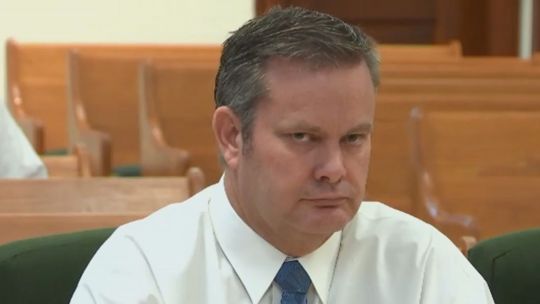
In the annals of true crime, there are those cases that capture the public imagination and refuse to let go. One such case is the story of Chad Daybell the enigmatic figure at the center of a dark and twisted saga that has gripped the nation.
Born in 1968 in Utah, Daybell has always been a deeply religious man, with a strong belief in the supernatural and the power of prophecy. Over the years, he has become embroiled in a series of bizarre and tragic events, culminating in the deaths of his wife and two of his stepchildren.
The Early Days: From Utah to Idaho
Daybell's journey into the dark side began in Utah, where he was raised in a strict Mormon household. He was deeply involved in the church and was known for his charismatic personality and his ability to inspire others with his religious fervor.
After marrying his first wife, Tammy, Daybell moved to Idaho, where he became involved in the local Mormon community. It was there that he met Lori Vallow, a woman who would become his second wife and the catalyst for a series of tragic events.
The Lori Vallow Connection
Lori Vallow was a woman with a troubled past, including a history of mental illness and a string of failed relationships. When she met Chad Daybell, she was immediately drawn to his charismatic personality and his belief in the supernatural.
Over the next few years, the two became deeply involved in each other's lives, sharing a passion for religion and a belief in the power of prophecy. However, their relationship was not without its problems, as Vallow struggled with her mental health and her increasingly erratic behavior.
The Tragic Deaths of JJ and Tylee
In September 2019, Lori Vallow's two children, JJ and Tylee, went missing. Their disappearance sparked a nationwide search, with investigators quickly focusing their attention on Vallow and her new husband, Chad Daybell.
As the investigation unfolded, it became clear that something was very wrong. Vallow and Daybell had become increasingly involved in a radical religious movement, with Daybell preaching about the imminent end of the world and the need for his followers to prepare for the afterlife.
In June 2020, the bodies of JJ and Tylee were found buried on Daybell's property, along with the remains of his first wife, Tammy. The discovery sent shockwaves through the community and raised questions about the true nature of Daybell's beliefs and motivations.
The Enigmatic Chad Daybell
Chad Daybell has always been a deeply enigmatic figure, with a complex personality and a complex belief system. He is known for his charismatic personality and his ability to inspire others with his religious fervor, but he has also been accused of manipulating those around him for his own gain.
In the wake of the tragic deaths of JJ, Tylee, and Tammy, many have questioned Daybell's sanity and his motivations. Was he a true believer in the supernatural, or was he simply using religion as a means to control and manipulate those around him?
The Legal Battle
Chad Daybell is currently facing multiple charges, including conspiracy to commit murder and destruction of evidence. His trial is set to begin in the coming months, with prosecutors seeking the death penalty for his alleged crimes.
As the legal battle unfolds, many are watching closely to see how the case will play out. Will Daybell be found guilty and sentenced to death, or will he be acquitted and walk free? Only time will tell.
The Impact of Chad Daybell on the Lives of Others
The tragic story of Chad Daybell has had a profound impact on the lives of those around him, including his family, friends, and followers. Many have been left questioning their own beliefs and their own actions in the wake of the tragedy.
For those who knew Daybell personally, the experience has been especially traumatic. They have been forced to confront the dark side of a man they once admired and respected, and they have had to come to terms with the fact that they were deceived and manipulated by someone they trusted.
Conclusion
In conclusion, Chad Daybell is a deeply enigmatic figure whose dark and twisted saga has captured the attention of the nation. His charismatic personality and his belief in the supernatural have inspired those around him, but they have also led to tragedy and heartache.
As the legal battle unfolds, many are left wondering how this dark chapter in American history will end. Will justice be served, or will the truth remain forever shrouded in mystery? Only time will tell.
0 notes
Text
Don't be sad! Think about how much better things are in that other timeline where Sergey Lazarev won Eurovision 2016:
Hillary is finishing up her second term, Tim Kaine is preparing to run
The Supreme Court now has a liberal majority
The GOP will probably never win again because it's split down the middle between traditional Conservatives who are enraged by Trump costing them credibility, and MAGA Confederates who keep calling for violence and succession. They absolutely hate each-other, and at their 2020 convention, there was an armed riot involving bikers and Neo Nazi "security personnel," in which 6 people died and 230 were arrested. No city wants to host their next convention because of this
Oh, in 2020 they ran DeSantis and he lost badly after the infamous "I Can Be Your Big Poppa, Ese," incident
After all this shit, Congress flipped to a Democrat majority and has held firm there. Democrats somehow flipped both Arizona and South Carolina
America did a solid 6 month lockdown for Covid that was brutal and led to a tragic uptick in ODs and suicides. But then we got the vaccine and Covid deaths going forward were really low
Everyone also got mailed $8,000 checks, so inflation is skyrocketing. But people loved those checks and the Socialists took advantage of that and the lockdown to win hearts and minds. There is now a growing Socialist wing in the DNC, and its House caucus is having hearings on corporate malfeasance and the abuses of the private healthcare system. Tim Kaine is going to run on "fixing" Obamacare by turning it into a nationalized system, and he is also flirting with nationalizing natural resources to pay for it without raising taxes
Everyone still dragged their feet over Ukraine, until Putin bombed a pediatric hospital. The US led NATO in upping weapons shipments. Russia responded by "accidentally" firing a dozen missiles into Poland. NATO now has a massive joint French-German-US force doing "drills" along the Polish border
Like every month there is a new attempted military coup against Putin, and he's responded by going full Stalin. Upwards of 2 million Russians are in the process of trying to flee Russia
After Netanyahu invaded Gaza following October 7th and reports of human rights abuses came out, Hillary immediately stopped all weapons shipments and the US spoke out against it at the UN, much to the chagrin of a lot of centrist Democrats. Netanyahu responded by attending MAGA events and privately going on a vicious misogynistic tirade against her that got leaked to the media. She was not amused. The open rumor is that she won't normalize relations with Israel again as long as Netanyahu is running things
EPA has declared climate change a priority crisis and is drawing up rules that are rumored to outlaw all fossil fuels in the US by 2040
Congress is about to pass the "California Plan," which will allocate $60 billion over the next decade for ambitious public transportation projects. Hillary likes to repeat how she is "trying to make America greater than it ever was."
YES, taxes have been raised. But mostly on top earners, and the IRS has been given a huge budget increase to chase down billionaire tax cheats
China and NASA are working on a joint mission to build a permanent moon base by 2035 (China has been real keen since 2020 to be friendlier to the West, FOR SOME REASON)
Elon Musk still bought and ruined Twitter. But it went so badly, with millions of users abandoning the platform, that he decided to flip it. A shady group headed by the Saudi Royal Investment Fund bought it for a pitiful $15 billion, and has since gone through 5 CEOs, failing to turn it into anything. It is now mostly just pro-Putin bot accounts talking to QAnon weirdos
Biden is quietly retired and his family is looking after him and his blood-thirsty dog
...I mean I guess this world is still pretty dark. That whole impending WWIII thing and all.
But hey, could be worse!
0 notes
Text
‘They Stopped Seeing Us As Human Beings’: How War Criminal Europe Provoked A Savage Modern Genocide In The Heart of Africa
Thirty Years Later, The Rwandan Genocide Reminds Africa That It Needs African Solutions To African Problems
— March 7, 2024 | RT
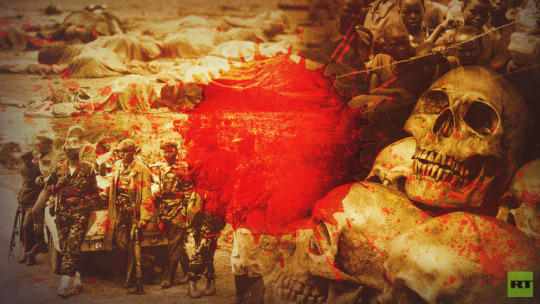
© RT/RT
“Our neighbors moved away from us, and we found ourselves isolated. They called us snakes. They stopped seeing us as human beings. Only a handful of neighbors came to drink at the bar I ran, the biggest bar in the area,” Dafrosa, a survivor of the 1994 genocide, recalls. “Markets and shops appeared where we were forbidden to shop. There they refused to sell us food; the cashiers said, ‘take your money somewhere else.’ From 1990 to 1994, politics began to divide people more and more. Segregation became commonplace. At first, there was no hostility in our church, but in other churches, the parishioners were divided and even refused to give communion to the Tutsis.”
The horrific events of April 1994 put an end to the illusion that the end of the Cold War and the ‘democratization’ of Africa would lead to years of peace and prosperity.
RT recalls how the bloody genocide began in Rwanda and whether it was possible to avoid.
How It Started
On April 6, 1994, two surface-to-air missiles shot down a plane as it approached Kigali, the capital of Rwanda. Then-President of Rwanda Juvenal Habyarimana and President of Burundi Cyprien Ntaryamira, on their way from peace talks in Arusha, Tanzania, died in the plane crash, along with seven other passengers.
The military, headed by retired Chief of Staff Theoneste Bagosora convened an interim government and declared that the Rwandan Patriotic Front (RPF) headed by Paul Kagame had been responsible for the attack. By that time, the RPF had been engaged in an armed conflict with the government for many years, and advanced towards the capital from the side of Uganda.
On that tragic night, Bagosora at a meeting of the General Staff of the Army tried to negotiate a transfer of power to the military but faced opposition from Romeo Dallaire who led the United Nations Assistance Mission for Rwanda (UNAMIR) at that time.
First of all, the conspirators got rid of moderate politicians. Among the victims were Prime Minister Agathe Uvilinhiyimana, Chairman of the Constitutional Court Joseph Kavaruganda, as well as a number of ministers and leaders of opposition parties. Their assassination greatly undermined any resistance efforts. Bagosora’s call for ‘revenge’ was supported by commanders, local authorities, and political experts, and was broadcast on Radio Television Libre des Mille Collines (RTLM) and other media.
100 Days of Genocide
Mass killings began in Rwanda’s Gisenyi Province (considered a stronghold of the authorities) just a few hours after the plane crash. By the next day, they spread to six more provinces, including the capital. The Presidential Guard, gendarmerie, Interahamwe youth detachments (‘interahamwe’ translates from Kinyarwanda as ‘those who work/fight together’), and ordinary people grabbed machete blades and agricultural tools, and wiped out the ‘Tutsis’, identified through documents or pointed out by their neighbors.
The wave of deadly violence began to decline as the RPF seized new territories in the north and east of Rwanda. In May and June 1994, the genocide continued on the territory which was not controlled by the RPF, while most of the intended victims had already been killed, the officials tried to direct the violence into the fight against Kagame’s detachments.
The mass murder of unarmed people went on throughout the country for about three months, leading to the death of several hundred thousand people. Though estimates vary depending on the time frame and other criteria, according to the Government of Rwanda, the official death toll is 1,074,107. The international community and the UN contingent stationed in Rwanda could not agree on any effective measures and merely watched the tragedy unfold.
During the about 100-day genocide, the RPF’s struggle with Habyarimana’s regime continued, and so did the conflict within the ruling regime – between supporters of the “moderate” course and the “radicals” led by Bagosora, who rejected any negotiations with the RPF. The genocide was eventually stopped, RPF troops led by Kagame entered the capital. From then and for many years, the RPF established itself as the undisputed ruling party in Rwanda, and the key partner for any external player in the region.
In the aftermath of the tragic events of 1994, Rwanda was devastated, its GDP plunged dramatically, and the political landscape in the African Great Lakes region changed completely.
The genocide was not initially planned as a full-scale elimination of all Tutsis, but as a political cleansing of the actual or potential opponents of the regime. However, this got out of control promptly and dramatically.
The Role of War Criminal France
It is a widely reported that France maintained close relations with the Rwandan officials, responsible for the genocide, right up to its culmination. Many Rwandans even believe that, in the summer of 1994, a limited contingent of French troops was sent to the country in order to help France’s close allies among the government officials to escape (Opération Turquoise).
Having come to power, Paul Kagame reduced the influence of France in his country to a minimum. On the official level, Rwanda abandoned the use of the French language and switched to English. It also joined the Commonwealth of Nations headed by Britain. In its first years, Kagame’s government received major support from the US, but later, driven by both historical and economic reasons, Rwanda formed a multi-vector partnership system that was increasingly oriented towards the East – for example, China and the UAE.
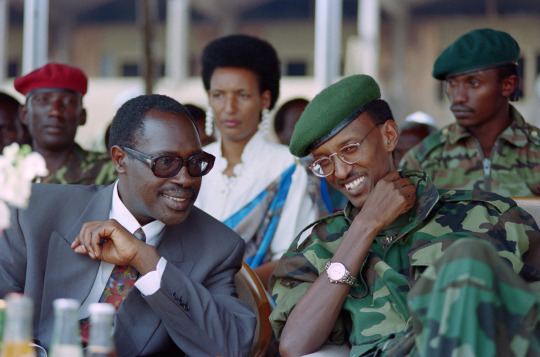
Rwanda's new elected Hutu President Pasteur Bizimungu (L) and his vice President Paul Kagame, the Tutsi-led RPF (Rwandan Patriotic Front) commander (R), share a joke in Kigali on July 19, 1994. © Alexander Joe/AFP
Where The ‘Tutsis’ and ‘Hutus’ Came From
It is often claimed that the ‘Tutsis’ and ‘Hutus’ are ethnic groups. This is not at all the case, since the differences between these imposed and outdated categories are rather social. The Tutsis and Hutus, — at the time these categories were in use, — spoke the same language and inhabited the same territory. They were historically part of one society and closely interacted with each other.
In modern-day Rwanda, division into ‘Tutsis’ and ‘Hutus’ is wisely abandoned and forbidden – all residents are Rwandans, and the descendants of the former Hutus and Tutsis get along very well. But this does not mean that these categories could not be reinstated in the future, should someone want to start another conflict.
Binary oppositions were always an important factor in the development of European culture. But in traditional African societies, hybrid identity was much more widespread – a person is often identified with several social and cultural groups, and the social structure allowed people to ‘switch’ their social identity multiple times in the course of life.
The ‘Tutsis’ and ‘Hutus’ became known as a result of complex overlapping processes, including migration, assimilation, and the division of labor in society. The ‘Tutsis’ owned cattle, and generally had bigger incomes and more weapons. The ‘Hutus’ people worked the land. In pre-colonial Rwandan society, the ‘Tutsis’ represented the traditional hereditary aristocracy. Both groups spoke the same language, their traditions and customs were part of a single culture. The cultural boundaries were often blurred, and this served as an antidote to conflicts.
For example, a member of the ‘Tutsi’ community could become a ‘Hutu’, and vice versa. Some people weren’t part of either group, or considered themselves members of both groups. In European terms, they were one nation, but represented different social groups.
However, German and later Belgian colonialists needed a way to effectively manage and control the population of Ruanda-Urundi (the colonial territory that preceded modern Rwanda and Burundi), particularly since the Europeans were few in number. Searching for a model of colonial governance, they resorted to racial theoriespopular in Europe at the time (and not just in Germany). Based on these groundless theories, the taller ‘Tutsis’, who allegedly came from the north, were innately superior to the thickset ‘Hutus’.
The genocide was not an accident nor a sudden, unforeseen event. It was a deliberate terror campaign directed against the assumed supporters of the RPF. By April 1994, this campaign had reached its apogee and resulted in deliberately organized mass killings of unarmed people.
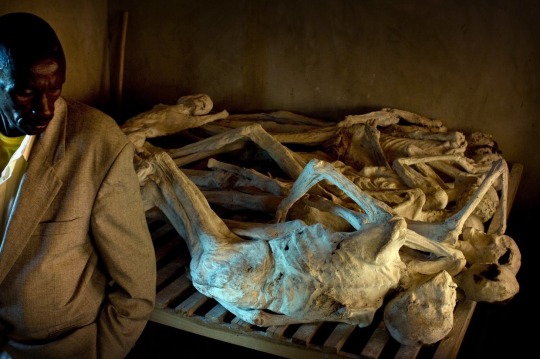
Bodies dug out from mass graves laid on a table in the Murambi memorial center in the south of Rwanda, April 19, 2008 in Murambi, Rwanda. © Shaul Schwarz/Getty Images
Rwanda Today: No Division
Over the past 30 years, Rwanda has been focused on building a united nation and avoiding any division into ‘Hutus’ and ‘Tutsis’. Progress in this respect is evident – the country has risen from the ashes, ensured sustainable economic growth, and turned into a regional stronghold of stability and security.
However, the opposition between the ‘Hutus’ and ‘Tutsis’ persists around. In Burundi, the percentage of Hutus and Tutsis in leadership positions is fixed at legislative level. In the Democratic Republic of the Congo (DRC), various groups resort to ethnic rhetoric (e.g. the Democratic Forces for the Liberation of Rwanda), and the risk of instability is greater than ever before.
Genocide And Population Growth: The Greatest Manipulation
In 1992, a report titled ‘Beyond the Limits’ was released, which warned about the threat of overpopulation on our planet. The report was published by the Club of Rome – one of the most influential behind-the-scenes non-profit organizations, notorious for its struggle with overpopulation. From an informational and ideological point of view, the report has strongly influenced how conflicts in Africa (including those in Rwanda) are viewed by the world.
The massive, months-long massacre, in the course of which ordinary people killed their unarmed neighbors practically with their bare hands, seemed to illustrate the horror into which the planet could plunge as a result of overpopulation and a lack of land, resources, and food. Several authoritative articles and monographs published in Europe and the US convinced the world that the tragedy in Rwanda had happened precisely because of overpopulation.
From this, an obvious conclusion was drawn that birth rates in the Global South – from Latin America to China – must be limited in order to avoid the repetition of the Rwanda scenario in countries like Nigeria or China. In reality, the Club of Rome and certain Western elites came to this conclusion in the interests of preserving their global supremacy and preventing the transfer of power to the world majority in the East and South. After all, the rise of the West to power and colonial expansion would have been impossible without the ‘demographic explosion’ that had once happened in Europe.
The myth about the overpopulation of Earth, including the ‘population trap’ and the food-shortage trap that humanity can fall into, is among the biggest information manipulations of the late 20th century. It has been based on a considerable number of ‘expert’ reports and scientific papers, publications, and discussions. However, by the second decade of the 21st century, it became clear that reality was a lot more complicated, and demographic growth in countries such as China, India, Ethiopia, and Nigeria actually ensured the development of infrastructure, agriculture, and allowed these countries to eliminate hunger. Today, all this is obvious, but in 1994, the genocide in Rwanda seemingly proved the opposite: that global overpopulation leads to catastrophes.
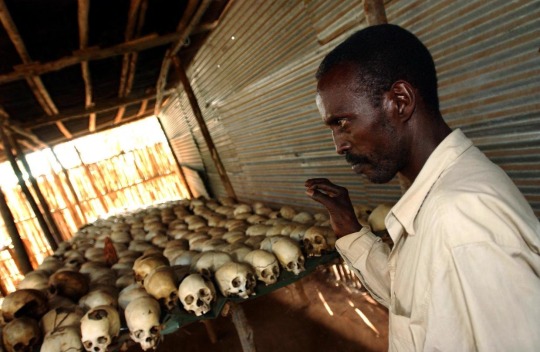
Pacifique Rutaganda, the guide of the Ntarama Genocide memorial where 5000 people were killed in the 94 Genocide, talks to an AFP reporter 26 May 2003. © Marco Longari/AFP
Thirty years have passed since the Rwanda genocide. Following a significant population decrease – from seven million people in the late 1980s to five million by the end of 1994 – by now, the population of Rwanda has surged to 14 million. Rwanda remains the most populous country in continental Africa, and is also one of the leaders in terms of economic growth. In terms of population density in Africa, Rwanda is surpassed only by Mauritius – which could well be the most prosperous country on the African continent.
Economic Growth Today
The supposed connection between population density, falling living standards, and food crises in Africa was merely an unsuccessful hypothesis. The expected growth of Africa’s population to three billion people in the coming decades is likely to solve the problem of hunger through market growth, infrastructure development, and agricultural production.
In Rwanda itself, economic growth is evident. In the past 30 years, crop production has increased more than sixfold, both due to increased agricultural productivity and because of new land included in agricultural turnover.
The length of paved roads has doubled to 1,200 km, exports increased from $100 million to $3 billion, and the capacity of power plants has increased sevenfold to 230 MWh. The growth of the Rwandan economy isn’t just a result of the balanced development of infrastructure, but is also due to the consistent development of the tertiary sector of the economy. In 2022, Rwanda’s tourism revenues amounted to $445 million. An important contribution in this regard is made by RwandAir, which offers 24 direct routes to 21 countries.
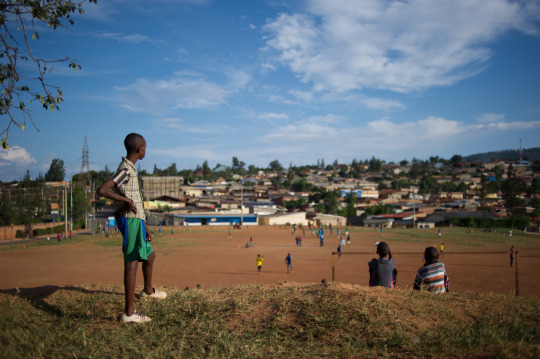
Rwandan youths watch a football game on March 16, 2014 at Gikondo suburb in the capital, Kigali. © Phil Moore/AFP
Why Did It Happen?
As for the causes of the genocide, we can now affirm that it was caused by external and situational factors. The electoral ‘democracy’imposed by France did not take into account the country’s traditions of governance and the class structure of Rwandan society.
The criminals who came to power united their supporters under the guise of protecting the interests of the ‘Hutus’, and incited people to violence, which was driven by induced class hatred. Meanwhile, external forces, including arms suppliers and smugglers, made money from the conflict. It was also convenient for the West as a means to justify its agenda and maintain its leadership position. Nevertheless, France was badly affected by the Rwanda genocide. In fact, the demise of Francafrique and the crisis in relations between Paris and Africa that has reached its apogee today, dates back to 1994.
What’s Next: Regional Hubs, Polarless Policy, External Impact
It is common practice for countries (and not just in Africa) to move their capital cities inland, away from coastal areas. In Africa, the most successful example of this is Abuja in Nigeria, and Dodoma in Tanzania may be next. This step signifies a change in the country’s system of development, as it moves away from a semi-colonial structure – when the country’s life depends on trade with the outside world through one or two large ports – to self-sufficiency ensured by internal growth resources and intraregional cooperation.
The next step is the formation of regional integration hubs in the inland parts of Africa, which would serve the needs of the entire continent. Such hubs are very important for the continent’s future. Rwanda is already turning into a remote communications and logistics center for Africa, and a distribution hub for the entire African Great Lakes region.
The construction of a new airport in southern Rwanda in partnership with Qatar Airways, and the construction of the Kigali dry port with DP World – a Dubai-based infrastructure and logistics company – can turn Kigali into an important transport hub and business center. However, the volume of foreign-exchange earnings is still insufficient to ensure the country’s continuous and rapid growth, and this remains a problem.
However, the part of the economy related to the processing and re-export of minerals from the DRC, as well as the supply of necessary goods (e.g. energy, food, medicines, and equipment) to the Eastern Congo market may ensure long-term growth, considering the growing global demand for Congolese metals. In order for this to happen, Rwanda needs to preserve a porous border with the DRC and expand its economic and political influence in North and South Kivu provinces. Peace – or at least keeping the conflicts in this part of Africa under control – is also an important prerequisite.
Among other things, Rwanda remains a positive example of a multi-vector and polarless policy characteristic of Africa. Qatar and the UAE are now forced to compete for Kigali’s attention. Even France, despite the painful history of relations between the two countries, remains among Kigali’s partners. Rwanda also maintains smooth, friendly political relations with the US, China, and Russia.
If it were not for external pressure on the DRC and Western attempts to limit China’s influence in Africa, the neighboring countries would certainly come to an agreement. Objectively, the DRC is interested in economic growth and development in its eastern regions, which would be impossible without Rwanda’s involvement. However, in recent years the conflict between Kinshasa and Kigali has escalated, acquiring sinister features which bring to mind the situation 30 years ago.
Statements by Western governments, which take an increasingly pro-Congolese stance, make the authorities in Rwanda nervous and contribute to the escalation. Nevertheless, for both Kinshasa and Kigali, it is more profitable to keep Goma (a city in the eastern region of the Congo) as a trading hub and logistics center, rather than turn it into a site of bloody battles. The tragic story of the Rwandan genocide demonstrates that the less external forces meddle in the region’s affairs, the greater its chance of living in peace and focus on development.
In July 2024, Rwanda will hold presidential elections. If the current president, Paul Kagame, is to be re-elected for another seven-year term, he will have to once again prove the effectiveness of the country’s post-1994 management model.
— By Andrey Maslov and Angelina Pshenichnikova, Center for African Studies at the Higher School of Economics, Moscow. The authors thank Daniil Makukhin and Vsevolod Sviridov from HSE for their help in preparing the article
#Africa#Feature#War Criminal 🇪🇺#Moder Genocide#The Rwandan Genocide#African Solutions | African Problems#War Criminal France 🇫🇷#Tutsis’ and ‘Hutus’#Genocide | Population | Manipulation#Economic Growth
0 notes
Text
Through the Wilderness: My Journey of Redemption and Healing in the American Wild
UnCovered review by Marraina Wagner, ACLS Ventnor Branch
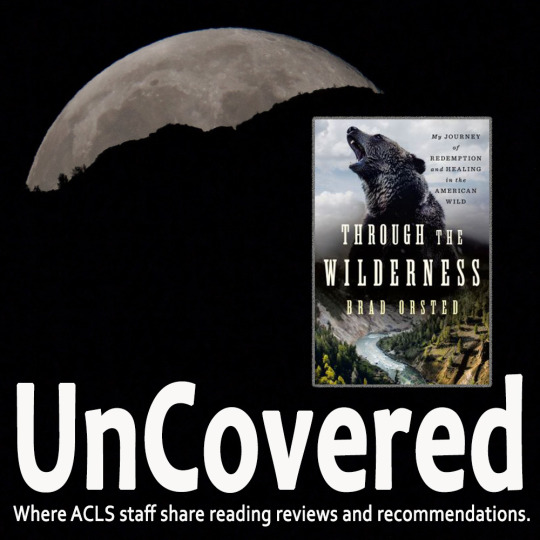
Paradise Valley, Montana…a little over two hours from West Yellowstone is where we end up with our author, Brad Orsted. In his memoir, THROUGH THE WILDERNESS: MY JOURNEY OF REDEMPTION AND HEALING IN THE AMERICAN WILD, he takes us through the battle for his sanity and healing right before he left Michigan for his wife’s new job. From my own personal experience, I know the healing power that the area he takes us to holds for those of us with broken souls.
I was previously familiar with Brad through his work with National Geographic and The Smithsonian Channel as a photographer and videographer. I have also seen his film “The Beast of Our Time.” He won an award for “Best Environmental Film” at the L.A. Documentary Film Festival. I had no idea of his story though.
Brad’s story, in my opinion, is a necessary read for anyone that has suffered child loss, substantial trauma, or addiction.
We meet Brad, two years after the death of his 15-month-old daughter, Marley. Consumed with grief, regret, and guilt, we time travel with Brad through his constant alcohol-fueled, lucid flashbacks, and both suicidal and homicidal wars inside of himself. He longed for answers from his mother and the Michigan police department. We start to understand that his mother was caring for Marley the night of her death. She also waited hours to call the police and immediately stopped speaking to Brad and his sister when this tragic event occurred.
Brad spares us no detail through his chaos and journey of healing in the wilderness of Montana. The path the reader will walk with him is cloaked in darkness, rage, and more profound grief. It’s riveting, relatable, and even offers the reader a sense of healing.
His face to face encounter with a massive grizzly bear opens the flood gates to Brad’s exact moment of revelation. It sets off a chain of events and encounters with more wildlife that have only one explanation: his destiny, which was already etched in the stars for him. Abandoned twin bear cubs teach him about survival, and a wolf pack teaches him about family.
Brad tells us about his friendship with Loren Black Elk in the 90s and how he sought out sanctuary with the Ojibwa in Michigan’s Upper Peninsula on Pine Ridge Reservation right after Marley’s death. He tells us that he still ended up being consumed by his darkness. The grizzly bear encounter reminded him of that time, and he went directly to The Crow tribe to seek advice and healing, again. After his time with the tribe in Montana, we begin to see light peeking thru every page turned.
In closing, I returned my copy with a few accidental tear drops on the pages. I too fled to Montana in early 2021 for healing. I had no idea he took a similar path in the exact places I did. His story touched my heart and soul. I privately emailed him thanking him for being so incredibly open about his pain and his journey. He sends his thanks to the library for the purchase and shelving of his story. He hopes to reach others that have suffered and are in need of redemption. We shared our stories of seeking ourselves in the Wilderness of Montana and the wildlife encounters that changed us forever. Also, the ones we look forward to knowing that our healing is for a lifetime. In my opinion, this book could be a best seller and is an incredible read. I cannot wait to see what he has in store for us in his 2nd book.
0 notes
Note
How I think some of the boys met v!mc
Diluc has been to Inazuma at least ONCE when he was a kid. Because his father's business does have some travelling around Teyvat. Since the Kamisato's takes care of events and such, they were probably invited by Mr. And Mrs. Kamisato to sell some of the dandelion wine in Inazuma. His father might bring him to join traveling for business affairs when he was a child to gain some experience. While he was staying there, he was bound to meet Ayato sooner or later. And once he meets Ayato he'll definitely meet v!mc. Since I'm assuming they're usually hanging around alot when they were still kids. When he was about to sail back, he told v!mc that he'll write letters to her every week. (When he heard that v!mc is dead he was surely heart broken, how could he not? He'll surely attend the funeral and visit her grave when he has time to sail to Inazuma)
Heizou is a detective, that lives in Inazuma, how could he not know the existence of v!mc? That's basically almost impossible except if your living under a rock. Heizou bumped (literally) v!mc when he was trying to solve a chase. It was an accidental encounter, even so he's still glad it happened. He wasn't paying attention where he was walking, and bumped into [name]. He thought the rumours were exaggerating about how pretty she is, but this proves him wrong. Now he can see why men all around would try and court her. After the encounter, he would purposely pop up here and there. Either suddenly popping up and helping her being some groceries, to popping up when she's on a walk around town. Either way he soon became quite close with her (he still isn't as close with her as ayato is) (when he heard v!mc was killed, he promised to bring the ones who killed v!mc to jail. They weren't even commended to kill any of the Kaedhara's. He visits her grave once a month, and puts a sweet pea flower on her grave (sweet pea flowers represent farewells and goodbyes and the remembrance of loved ones and close friends))
-🌿 (I went overboard with Heizou's part. I hope tumblr won't eat up this ask again 💀)
Hm, Diluc meeting Vigil!MC is interesting. If it's through trade and business the possibilities are there, yes. It won't be too high but it's a possibility, regardless.
I mean, there's this tea man in Liyue who lowkey wants dandelions-
Feiyun Commerce Guild distributes the products from Liyue into Inazuma too- wait lol for some reason I'm realizing that Mondstadt is a much more closed-off nation, isn't it-
I don't think it's high on trade at all, unlike Inazuma/Liyue-
BUT DIGRESSING, becoming penpals with Diluc sounds shucking adorable. It's nice... and tragic, because Diluc experiences something awful down the way :(
I suppose the angst part comes into play when his ideals change after the death of Crepus and he stops writing letters to MC. Since, you know, Fatui priorities.
The letters stop, but even when he's 'mellowed' out of his past, he thinks about his penpal. I'd like to tragically imagine that he learns of Vigil!MC's death through Venti, who drunkenly tells him of everything he's learned one night in the tavern.
Just the pause, then the slow encroaching blue devils. Sigh :(
-
NOW HEIZOU SQUEA-
He would've definitely heard of the renowned Kaedehime. A first-born daughter, heiress of the Kaedehara who was rumored to want to restore the family's honor? Hm~
And yes, it's really also known how- gosh shucks Vigil!MC is pretty. Like, madly pretty? She's definitely a tie with TS!MC. Her beauty also has to do with her lovely personality, who wouldn't like her 😭
I'd say that Heizou thinking the others were being so hyperbolic over their compliments about MC is soooo accurate lol. He's prolly the "give the benefit of the doubt yes but i won't believe it 100% until i see it for myself" kind o guy.
He'd say something like, "So they aren't groundless words after all.." after seeing her lol
MC, dense and confused tilts her head like, "What?"
Heizou just- "Aha! I meant, encounters such as these truly work wonders to enliven someone's day."
"Oh, serendipitous meetings, yes? Truly a wonder! :D"
Heizou: ... yes :D (i meant coming across someone like you, i guess she's as oblivious as they say, too-)
HDSAKDHAJD-
When Kazuha became a criminal and the grave penalty to execute defiers of the decree was extended, Heizou was at a loss. No one defies the Shogun but his friend had done so, courageously well, albeit to a consequence.
It isn't uncommon for criminals to face death but what's rare is for the punishment of one to extend to immediate families, so innocent MC is caught in the crossfire :(
I imagine him attempting to reason with Sara, who dispatches the soldiers upon orders of the Shogun, and stalling said soldiers to maybe buy MC some time to escape with Kazuha- but it still ended up being futile.
I'd say he worked with the Kamisato and put in a really rational debate with Sara so that MC and Tomo would be buried on Inazuman soil and not cast away in the sea.
And yes- ah, he'd visit her grave, definitely.
Sometimes he'd wonder what would've happened if he chose to openly defy the order to end the Kaedehara and helped her escape himself. But alas, those thoughts are too late to consider.

68 notes
·
View notes
Note
Ok hear me out. Spencer is dating Reader and she’s always hated that she’s been more chubby/curvy. And one night in the middle of a case she calls him crying and Spencer just gets really soft and calms her down after a bad nightmare. And his heart breaks cause his loving girlfriend hates her body. So Spencer plans this elaborate date and proposes maybe? You can decide if the team have met her or not. I’d like it to be the original team but if you wanna combine the original and new teams together that’s cool too!
no bc my body image issues have been rampant lately so this is personal as hell to me. I work out a lot and i’m fit but i’ve never been SKINNY like i have thick legs and muscular arms andnnfnfjndjnffn so this is personal.
I modified this a bit but it’s still the same premises hope you like it! ***BTW IN THIS UNIVERSE THE S3-7 CAST EXISTS FOR THE ENTIRE SHOW— SO THE LATER SEASONS HAVE MORGAN AND HOTCH.
also sorry this is a long
TW: body image issues, discussions of food & weight, insecurity, crying, kissing
WC: 1.5k
-
You know, pragmatically, that you have nothing to worry about. Spencer chose you. And for the past four years, Spencer has worshipped you every day— again and again. He is the most loving, considerate, and tender partner you could ever wish for. He is near perfection.
You’ve met Spencer's friends many times. You’re not close with either of your parents, so the team of profilers welcomed you into their arms with grace and care. Each and every one of them is beautifully amazing and exceptionally brilliant.
Spencer‘s friends are not only badass, but they’re also gorgeous. JJ, Emily, and Garcia are national treasures— so visually stunning it’s almost sickening.
You knew he used to have a crush on JJ way before he met you. You’ve also heard the tale of Lila Archer, the celebrity actress who made out with your boyfriend in a pool. Spencer’s had an eventful life, full of beautiful, sweet, magnificent women— so why does he choose you?
You view yourself as bland in comparison. What do you have to offer Spencer that he can’t find elsewhere? You don’t have toned abs, slim hips, and slender arms. You’re not striking in any way.
Spencer calls you every night when he’s away on a case. He’s never missed a call, even when he got shot in the neck and kidnapped by a murderous cult. He’s reliable and consistent, and that eases your worries a little bit.
It’s eleven pm in D.C. and your phone rings right as your getting in bed.
“Hi, my love,” Spencer says breathily, his voice slightly muffled by the phone. He’s away in Ohio for a case.
“Hey.” You reply, the sweetness in his voice soured by your mood. “How’s the case going?”
“Good. JJ and I are about to pass out in our beds— we’re so tired.”
You can’t help the way your face drops. “Oh. Well, get rest.”
Your about to hang up before he interjects. “Hey, what’s wrong?”
“Nothing. Why?” You know better than to lie to your boyfriend, who happens to be an expert on human behavior.
“Okay, I know a lie when I hear one. (Y/N), baby, what’s wrong?” He pleads.
You can’t help the tear that rolls down your cheek. “God, I’m sorry. I just miss you so much. You always know what to do when I’m feeling like shit.”
Spencer knows how much you struggle with self and bodily acceptance. He hates the world for making you feel anything less than incredible, both inside and out.
“I miss you too, so much, (Y/N).” His voice is thick as if he’s going to start crying too. “I love you so much, so fucking much. You have no idea how beautiful and amazing you are.”
“I don’t deserve you.”
“That’s the stupidest thing I’ve ever heard.” He laughs through a sob that wrecks his body. “You deserve everything in this world. I promise to give you everything you’ve ever wanted. You are the love of my life.”
You wipe the tears from underneath your eyes. “Sorry for keeping you up. You must be tired.”
“Never, if it means I get to talk to you.”
“I love you, Spencer.”
“I love you too, (Y/N). More than you’ll ever know.”
-
Spencer wakes up the next day with a newfound determination. The team solves the case as fast as possible, and by the end of the night, they’ve boarded the jet back home.
Spencer has more than enough hours to think about you and how much you mean to him. Hotch is seated directly across from him, rereading the case files.
“Hotch?” The wiser man looks up from his files, raising an eyebrow.
Spencer pauses for a moment. Maybe he’d be better asking Morgan or JJ for advice, considering Hotch’s tragic circumstances regarding Haley.
But no one loves like Hotch does-- sincerely, passionately-- stronger than anything else in the world. Spencer decides there’s no one better to ask.
“How uh did you know that Haley was the one?”
Hotch’s eyes soften for a bit. He clears his throat. “I knew since the day I met her that I would love her for the rest of my life unconditionally. She makes me complete. Do you feel that (Y/N) makes you complete?”
He already knows why Spencer is asking for his advice, steering the conversation in that direction.
“Yes. She’s my world.” Spencer whispers.
“Then it’s simple, really. Love doesn’t need to be complicated and precise. It’s what you do with it that matters.”
“I want to marry her, Hotch. I want to be with her for the rest of my life.”
Hotch smiles, “Then do it.”
Spencer feels the rush of excitement as he gathers everyone on the jet, including the prior sleeping passengers, filling them in on his big plans.
“I need all of your guys’ help.”
-
There’s a firm knock on your door at four in the morning. You know it isn’t Spencer because he has a key, but who could it be?
You take a cautious look out of your peephole to find Penelope, Emily, and JJ outside.
“What are you guys doing here?” You yawn. “For god's sake, it’s four am.”
“We know, and we’re sorry.” Penelope smiles.
“Is Spencer alright?” You ask, wondering if things suddenly went wrong during the case.
But by the joyous look on their face, you know nothing somber occurred.
“Spencer’s completely fine. But, we need to you to get changed and come with us. FBI’s orders.” JJ chuckles.
You change into warmer clothes in minutes, and the BAU ladies usher you into Emily’s car as fast as possible.
“So, no ones gonna tell me what’s going on?”
They shake their heads, “We’re just... running a quick errand.”
After a few more minutes of driving, Emily parks on the side of a dimly lit street.
“I need you to put this on.” She says, holding up a blindfold.
“Are you guys gonna murder me?” You joke, slipping the fabric over your eyes with little resistance.
“Quite the opposite, actually.” You don’t have time to think about what Penelope means before you’re being yanked out of the car.
You walk, guided by JJ, for four minutes. The grass beneath you crushes below your boots, and the hushed whispers of Emily and Penelope behind you do nothing to calm your nerves.
“Okay,” JJ says, halting to a stop. “You can take off your blindfold now.”
You hesitantly slip the blindfold off, revealing a brightly lit table in the middle of a secluded field. Morgan, Hotch, and Rossi are standing off to the sides.
Suddenly, Spencer emerges from behind a tree, dusting the leaves and dirt off his adorable sweater.
“Hi?” You laugh, utterly confused by this situation. “What’s going on?”
His hands are shaking, and he has to swallow a few times before he can speak. “I-I uh got y-you apple pie— uh your favorite.”
Spencer walks you towards the table, where a small slice of warm pie sits lonely on the table.
“Y-you should um... eat it.” He urges, pointing at the knife and fork next to it.
You glance around, trying to gauge the emotions of everyone around you, but fail. Stupid profilers and their poker faces.
Your fork cuts into the heavenly smelling pie, and you scoop up a bite into your mouth.
“It’s... good? I’ll pretty much eat any pie you give me, Spencer.”
He smiles, “I know that. But t-this is a special pie.”
“Okay...”
“You should t-take a closer look— at the pie.”
You inspect the dessert, completely puzzled until a glinting piece of silver catches your eye. Spencer notices the shock in your face and catches the plate that almost falls out of your hand.
Morgan hands him a napkin, and when Spencer pulls an apple-covered ring from the slice of pie, you almost faint.
“No way.” You gasp; tears spring to your eyes as Spencer wipes the ring clean.
He holds it tightly between two fingers, bending to kneel on one knee.
“(Y/N) (Y/M/N) (Y/L/N), I knew from the moment I met you that you were the most special woman I’d have the pleasure of meeting. A month later, you asked me out for our first date, and I couldn’t believe that someone as gorgeous and amazing as you would settle for someone like me.” You scoff at his humility.
“I spend every moment loving every part of you, (Y/N). None of my love will ever stop— ever. I promise to share my heart with you until the very end. There is absolutely no one I would rather be bonded to for the rest of my life. You are better than my dream girl because you’re real. You’re here, and you chose to love me every day— the good, the bad, and the ugly. (Y/N), will you do me the honor and great privilege of allowing me to become your husband?” You silently sob.
“Please say yes.” Spencer smiles.
“Yes!” You exclaim, pulling him up to hug him. “How could I say anything but!”
The dam breaks, and the entire team begins to cry as you and Spencer share a passionate kiss, almost collapsing down onto the grass from the sheer force of your love. He slips the ring onto your finger; it belongs there.
“I choose you, (Y/N).” He repeats.
“I choose you, Spencer, always.” You whisper into the crook of his neck.
Nothing’s ever felt so right.
#spencer reid#criminal minds#spencer reid smut#spencer reid fanfiction#sub!spencer#criminal minds fanfiction#spencer reid x reader#dr reid#criminal minds x reader#criminal minds smut#spence#spencer reid fluff#spencer reid angst#spencer reid fanfic
282 notes
·
View notes
Text




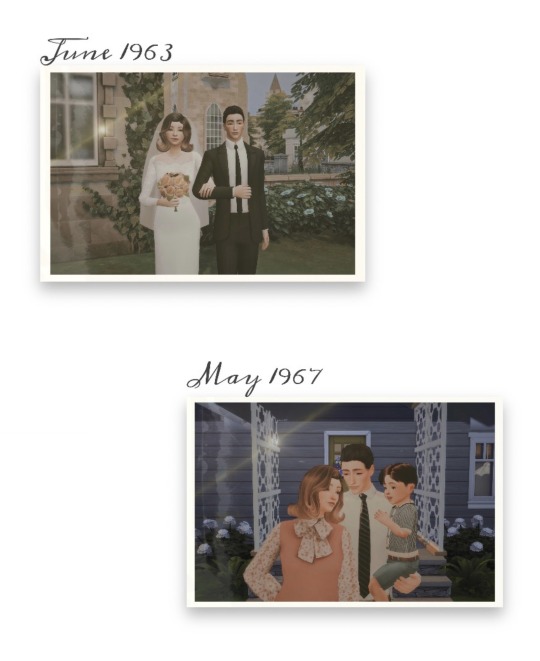

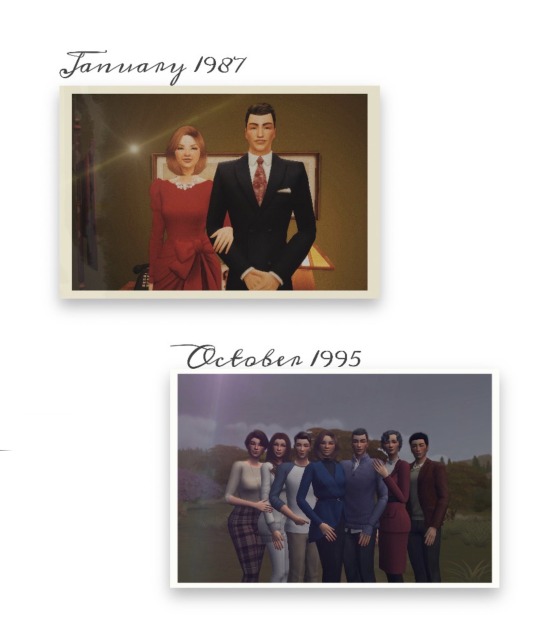
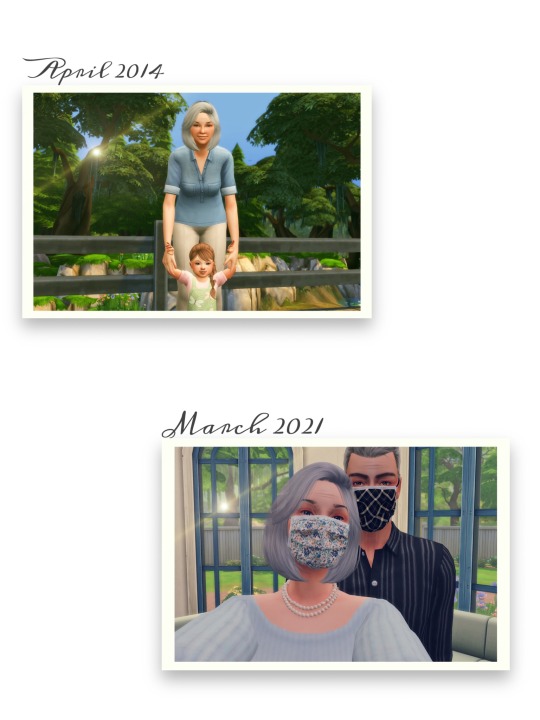

Margaret Ruth Kendall, or Peggy as she likes to be called, was born March 19, 1941 to Art and Marge Kendall of Willow Creek, Washington. Peggy’s early years were marked by the war and the departure of her father and uncles to fight overseas. Her father came back, but two of her uncles did not.
She was young during the war however and it didn’t impact her childhood as much as it did others. After all, her father was alive. She spent the rest of the 40’s and the early 50’s playing with her friends and cousins and helping out at her fathers store, and by the time she started high school in September 1955 she and her best friend Karren were inseparable, so much so that her parents often took the two to Brindleton Bay in the summers.
In high school Peggy thrived, she was clever and dedicated to her studies and she was a social butterfly among her peers. Not only was she a 4.0 student, but she was active in the drama department, the school paper, Torch Tri-Hi-Y and the Hi-Y council, dance committees, honor society, latineers, and she was elected vice president of the senior class. She had a few boyfriends in high school and she went to the junior prom with Jerry Campbell, a friend from the school paper, and they began going steady.
Peggy graduated top of her class from Willow Creek High School, class of 1959, and continued her education at Britechester University on a scholarship. She was still going steady with Jerry, who also attended Britechester, and the two planned to marry after they graduated. College was another successful endeavor for Peggy, she was able to excel in challenging classes and in June 1963 she and Jerry graduated.
Three weeks after the commencement ceremony Peggy and Jerry were married at Willow Creek Church after being together for five years, much to the delight of their friends and family. Jerry began a job as an editor at the Willow Creek Tribune and Peggy soon came on as a secretary. They settled into a small house near the river, close to their work and to Peggy’s family.
In January of 1965 their son was born, a little boy named Danny for Peggy’s late uncle. Two years later they were expecting again and in June 1967 their daughter was born, Marjorie, named after Jerry’s late mother.
From fall of 1969 to spring of 1971 Jerry entered a program through Foxbury Institute to earn his masters degree, navigating a long distance relationship with Peggy and the kids while he lived on the East Coast. His efforts payed off and once he returned home he was offered a high paying executive position within the local government.
The 70’s were a relatively stagnant yet changing time as the children grew into teenagers. Peggy and Jerry had their challenges, but they still loved each other every bit as much as they did twenty years earlier.
The 80’s brought with them a drastic transition when Jerry was offered a job at the nations capital, a job too good to pass up. Peggy resisted the move, what with Danny being a sophomore in high school and Marjie soon to be a freshman, but when the school year came to an end the family relocated to Newcrest, a suburb near Jerry’s new work.
In June 1983 Danny graduated from Newcrest High School and moved into his college dorm a few months later, followed by Marjorie in 1985. Now empty nesters Jerry and Peggy had more time for each other, though they missed their children when they were out of the house. Jerry’s work presented a handful of opportunities for him and Peggy often accompanied him to galas and events.
Fall of 1987 brought with it tragic news at the passing of Jerry’s brother, followed by the death of a close family friend in 1990 and Jerry’s father later that same year. In 1995 the remaining Campbells reunited back in Willow Creek from their homes all across the country.
The late 90’s and early 2000’s saw Jerry finish out his career, finally retiring in 2006 at the age of 65. If he wanted he could have gone on to run for office, but Peggy’s father was ill and he knew how much she wanted to move back to Willow Creek. So in 2006 they moved back to Washington where Peggy’s parents resided and late 2006 Peggy’s father passed away, followed by her mother a few years later.
While the loss of her parents was hard on Peggy, she enjoyed her and Jerry’s retirement. Danny and his family lived nearby, and in 2011 their great-granddaughter was born, the first great-grandchild. Peggy spends her time reading and gardening, and she loves to bake with Jerry (a hobby she could never be trusted with on her own due to a certain incompetence in the kitchen).
The pandemic hit in 2020 and the state went into lockdown just three days before Peggy’s 79’th birthday. As challenging as it was Peggy and Jerry did their best to quarantine, having their groceries delivered and meeting with their children and grandchildren and great-grandchildren in the yard and over zoom.
On March 16, 2021 they celebrated Peggy’s 80’th birthday with a small, socially distanced gathering in the backyard. Both celebrated being fully vaccinated and by Easter will be fully immune. They look forward to things opening up and being able to se their family and friends face to face again.
(Photo index under the cut)
***
(Top to bottom, left to right)
(Photo 1) Art Kendall, Peggy Kendall, Marge Kendall; May 1944
(Photo 2) Peggy Kendall; August 1949
(Photo 3) Peggy Kendall, Karren Lia; August 1955
(Photo 4) Peggy Kendall, Jerry Campbell; April 1958
(Photo 5) Peggy Kendall; June 1959
(Photo 6) Art Kendall, Peggy Kendall, Marge Kendall; June 1963
(Photo 7) Peggy Campbell, Jerry Campbell; June 1963
(Photo 8) Peggy Campbell, Jerry Campbell, Danny Campbell; May 1967
(Photo 9) Danny Campbell, Peggy Campbell, Marjorie Campbell; December 1974
(Photo 10) Jerry Campbell, Peggy Campbell, Marjorie Campbell, Danny Campbell; June 1983
(Photo 11) Peggy Campbell, Jerry Campbell; January 1987
(Photo 12) Donna (Little) Campbell, Carla (Wright) and Ray Campbell, Peggy (Kendall) and Jerry Campbell, Carol (Campbell) and Thomas Warner; October 1995
(Photo 13) Peggy Campbell, Bella Campbell; April 2014
(Photo 14) Peggy Campbell, Jerry Campbell; March 2021
Thats all! I hope you enjoyed this little glimpse into the life of my oc, as I've said she is very near and dear to my heart and I've put in a ton of effort and late nights into making this look the way I wanted.
#s4 alpha#sims 4 decades#ts4#s4 decades#the sims 4#sims 4 50's#1950’s#life stages cas challenge#sims 4 legacy#sims 4#s4#s4 edit#sims legacy#ts4 mm#ts4 alpha#s4 story#sims 4 1950's#50's#ts4 legacy#sims 4 life stages#<3
185 notes
·
View notes
Text
The Return
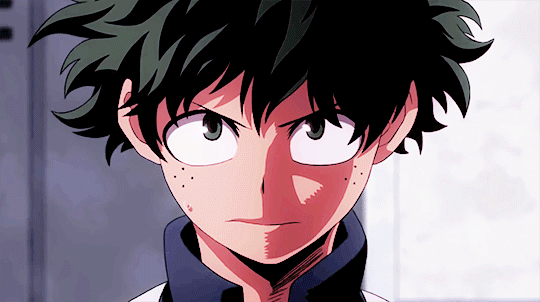
Yandere!Midoriya x reader
warnings: yandere, mentions of violence, smoking, creepy, dark themes
A/N: This is just a short little snoot based on a scary story I used to tell around the fire while camping. Mind the warnings.
It had been several years since Izuku Midoriya disappeared without a trace. The police and the heroes alike searched for months and months with nobody finding a damn thing. It was a national tragedy; Deku had the potential to change the world for the better and his loss would never be forgotten. There was even a day reserved for him where people would light green candles and place them on their porches and balconies where they would pray for his return. His mother wailed, his friends mourned, and you were free.
You were free. Free from those yearning stares, those two-long hand touches, those unsolicited gifts, and those unwarranted nighttime visits. You always knew you were never safe with Midoriya around—or possibly you were too safe—and when he stopped existing, your life had gotten better. Easier. You no longer had to live on edge, afraid of catching a tuft of green hair around every corner, spying on you through any window he could find, finding you even when you were out of town. He was gone.
You were free. Until you weren’t.
It was all over the news: the surprising resurgence of the tragically-lost, rising hero Deku. You’d heard it and seen it. The man who claimed to be Izuku Midoriya had the same unruly, curly hair that bounced when he walked, the same eager, green eyes that complimented his innocent facade, and the same brutal scars from all those times he’d broken his bones that fed his emblem. He looked exactly like Midoriya, only more refined. He was more muscular, a tad taller, and there was a gleam in his eyes that hadn’t been there before. You’d heard from friends all about how he retained all of his memories from before his disappearance—even the ones that nobody would know about except for him—but had no memory of where he’d been or what had happened while he was lost.
There wasn’t a single soul on the planet that didn’t believe that Midoriya had returned. You knew better. You knew that he, whoever he was, was an imposter. But it wasn’t like you could prove it.
For weeks, you avoided places where you knew this faux-Midoriya was going to be. Friends invited you to ‘welcome back’ parties where Midoriya’s life would be celebrated, but you never showed. You didn’t take the main streets where you knew this new hero would be patrolling, always making sure to check the news to see every instance the camera caught him performing one of his many good deeds. You might’ve been getting a little obsessive yourself, but it was worth it to never have contact with the imposter.
It didn’t take much time for the long-forgotten creeping feeling to sneak its way into your home and on your skin. You didn’t think that faux-Midoriya would know to stalk you like the real Midoriya, especially since the real Midoriya had always kept that part of his life secret and safe, just as you kept the event that let you know Midoriya wasn’t really back locked away inside your mind. You hadn’t ever told anybody about it. Still, you knew he was watching you. You never saw him, but you felt him.
As the days progressed, this feeling only got worse. You would find bouquets of flowers left on your doorstep and little notes left on your car. You’d told you friends how you were feeling unsafe, dancing around the topic of how insane you thought the world was for buying that Midoroya had returned, but whenever you brought it up, you were met with rolling eyes and tea sips. Even Bakugou believed it was really Midoriya who had returned, and you’d only found out that little fact when you attended a rather large get-together at a nearby bar to celebrate a huge win for the Ground Zero hero agency.
The only reason you went out was because you thought Midoriya wasn’t going to be there. You missed seeing people, and you’d thought you were going to be safe since Bakugou never seemed to like Midoriya, but it seemed that years away from one’s annoying ex-rival softens one up a little.
Panic struck you as soon as you saw him. The imposter was chatting it up with another hero, asking them questions about their quirk and support items, much like the real Midoriya would be doing, when those soft green eyes slid over to you. His face lit up and he smiled that smile—the one that was only reserved exclusively for you, the one that made chills run down your spine.
You were out the door immediately, shaking uncontrollably, crumbling against the bar’s side wall. It took a couple attempts for you to finally light the cigarette between your trembling fingers, but before you could take your first drag, you heard him speak.
“You really shouldn’t smoke.” His voice was like sweet cream, rich and soft. Your gaze went up to meet familiar kind, dishonest eyes. “You’ve always had such pretty skin. I’d hate to see you ruin it.”
“M-Midoriya,” you whispered, tone flat, voice hoarse. He crouched down beside you and brushed some of the hair in your face back and behind your hair. It was such a small gesture, but you felt completely violated.
“Hi, bunny,” not-Midoriya said, “It’s good to see you.”
You shook your head, because his appearance was absolutely uncanny. This man was Izuku Midoriya, only there was no possible way that could be true.
Midoriya seemed content by your befuddlement. You were sure he was enjoying this new life, eating up all the attention he’d gotten since his return, but he didn’t have you to torture. The real Midoriya could never live without filling you up with unease.
He eyed the cigarette burning between your fingers and clicked his tongue. “You’re shivering,” he mused, taking the cigarette out of your hand. He smiled faintly at its cherry, took a long drag, and put it out against the brick wall. Then, he clasped his hands over yours. “Do you know how much I’ve missed you?”
“Don’t-!”
His touch lingered like it always used to. He hummed and brushed his thumb down the palm of your hand, gazing up at you through too-long lashes. “I’ve missed that face you’re making too.”
You had to remind yourself that it wasn’t him. It couldn’t possibly be him. You knew better. You knew what happened. It wasn’t him.
“I know what you’re thinking.” Midoriya flashed a wide, pearly-white smile and brought your hand up to his cheek. He was warm from his blushing. He’d always been so warm. He closed his eyes and pushed your hands down to his neck—the last place you’d touched him when he was alive. “But you should know,” he whispered darkly, “nothing will ever keep me from my bunny for too long.”
“No,” you croaked, pulling your hand back. This wasn’t real. He was supposed to be gone. You were supposed to be free.
“Yes,” he crooned, eyes opened and gleaming with delight..
It couldn’t be him. It could never be him. Izuku Midoriya was gone, and this man was a fraud. You were sure of it. He could look, sound, and feel like him, but there was a zero percent possibility that he had returned.
You would know. You burned his body after you killed him.
TAGS FOR EVERYTHING(CLOSED): @ayeputita @yandere-inamorata @dee-madwriter @unboundbnha @rizamendoza1987 , @rubycubix @smbody-stole-mycar-radio @zellllyyyy @sarcastictextstuck @kpanime @lemonlordleah-shinzawa-kitten @captain-sin-allmight-queen @psionicsnow @wickedlewicked @ghost-of-todoroki @kattariapenn @im-an-adult-sometimes @bnhya @local-senpai @eggpienutbuttercroissant @usernamekate94 @reyvenclaww @hi-ho-and-hello
#bnha x reader#midoriya x reader#yandere!midoriya#yandere bnha#bnha yandere#yandere x reader#yandere male#tw creepy#izuku x reader#bnha reader insert#reader insert#x reader#deku x reader
892 notes
·
View notes
Link
Mark Twain is said to have remarked that if history does not repeat itself, it often rhymes. Societies have a tendency to continue patterns of policy or actions, sometimes in spite of their previous and obvious deleterious or ineffective effects.
Evident in Myanmar today is the tragedy that is unfolding. Discernable patterns emerge where the leadership and the people have been through much of the same trauma before, but seem to be unaware of, or indifferent to, prior consequences. The times, generations, technology, and the international sphere may have changed, but the institutional patterns reemerge with dire consequences, even if memories have faded.
The Feb. 1 coup was the fourth since Burmese independence in 1948. The first, in 1958, was “consensual” because the legislature agreed to a time-limited Tatmadaw (Myanmar military) takeover, although it did so under duress. The second in 1962, designed to perpetuate military dominance, resulted in the loss of one life, and was an attempt at complete domination of society through an autocratic, single-party socialist state. The third in 1988, followed the “chaos” that was in effect a response to a failed people’s revolution and the massive losses of life that the military had unintentionally instigated through brutality and mismanagement. It was designed to prop up an unsuccessful military government and continue its hegemony in society. Myanmar cannot match the frequency of Thailand‘s coups, but it far outstrips Thailand in loss of innocent lives and the Tatmadaw in Myanmar far exceeds Thai military control over its society.
At first, the 2021 coup seemed different from that of 1988. Ostensibly, it was prompted by Tatmadaw allegations that the National League for Democracy’s (NLD) overwhelming victory over the military-backed Union Solidarity and Development Party in the November 2020 election was marred by massive fraud, and the NLD’s subsequent refusal to negotiate with the military.
Yet the Tatmadaw had command of those state administrative elements that ensured that their interests, and those that that they regarded as essential to a unified state, would remain under their control through the military-written constitution of 2008. Thus the election did not seem to threaten military interests, no matter how much it may have humiliated the Tatmadaw. The charges of NLD manipulation of the November 2020 elections seemed an exaggerated and very weak excuse on which to place their actions.
The Tatmadaw appeared initially to be avoiding violence, contrary to 1988, and used police rather than soldiers to control anti-coup demonstrations. But as the protests continued and spread nationwide, indiscriminate military killings and beatings became evident. It seemed the Tatmadaw had learned nothing from the hostility it had created through its brutality a generation earlier.
According to the State Administration Council, as the military called its supposed temporary government (it refused to be known as a “regime” or “junta”), elections will be held after one year, providing some stipulated conditions have been met, such as dealing with Covid-19 and election reform, as well as ethnic minority peace, which seems unrealistic, and the winning party will take over government.
This is a theoretical repeat of 1958, when the Tatmadaw-administered government, with the consent of the civilian legislature, ruled for a supposed six month period that turned into eighteen months. At that time, the military did a credible, if autocratic, job and supervised a relatively fair election in which the military’s preferred party lost, and the Tatmadaw went back (temporarily) to its barracks.
The situation is different today. A young generation has access to technology that keeps them in touch with the world, each other and which unites them. This generation cannot be isolated, is far better educated and is aware of the limitations of military authority. If they are forcibly cowed, that will be short lived and some apolitical event or incident could easily set off a new series of protests at any time. The real purpose of the coup seems to be the emasculation of the NLD and the removal of its leader Daw Aung San Suu Kyi from the political sphere.
After the 1962 and 1988 coups, the judicial system was completely under military control. The charges made against those opposed to the military in 2021 are risible instances of the “rule of law,” which the military constantly invokes as it cuts off rights and subjects the population to authoritarian demands.
The opposition NLD today has invoked some of the past actions of the same party. When the military ignored the results of the 1990 elections, which were swept by the NLD, a group of elected members went into hiding and proclaimed an alternative government to the military. Eventually, it fled the country to Thailand, and ended up in Washington, D.C. where it lobbied Congress and successive administrations to recognize its legitimacy. So too after the 2021 coup, some elected NLD members, who could not take their seats in parliament, proclaimed the Committee Representing the Pyidaungsu Hluttaw (CRPH) as representing the legitimate government, and sought support and foreign recognition. The military considers that those in or associated with the CRPH are involved in treasonous acts and has threatened them with prosecution.
The United States has also resumed an earlier pattern. In the 1990s, it imposed rigorous sanctions against the then junta in Myanmar, which simply let the Chinese assume a position of engorged importance—resented by the Burmese and of concern to the U.S. The new series of sanctions in 2021 are far more targeted and sophisticated than previous ones, but U.S. and Western leverage is extremely limited. Yet Congress feels it must respond to the outrageous crimes against humanity; the most ardent supporter of Daw Aung San Suu Kyi in Congress has been Senator Mitch McConnell.
The imposition of sanctions is unlikely to bring regime change, which was the policy of both the Clinton and Bush administrations in the 1990s and 2000s. The West, including the European Union, Canada, and Australia will probably follow with sanctions. China, India, and the ASEAN states will demur. Japan’s Ministry of Foreign Affairs will be under pressure from the U.S., but Japanese business interests are extensive and are, in effect, the modest counter to Chinese influence. China will support any stable government in Myanmar because of its strategic interests and its extensive Belt and Road infrastructure projects.
However this present crisis ends, we are witnessing the beginnings of a long-term tragedy. The Tatmadaw appear to have learned little from its earlier actions and the enmity that the bulk of the populace feels toward their brutal actions will only increase. Future violence prompted by some apolitical event is predictable. The younger population, frustrated by repression yet aware of the opportunities of their contemporaries in neighboring states, will be denied the ability to contribute to society. The people at large will suffer as the economy contracts, foreign investment dwindles, employment stumbles, and the international market for many of Myanmar’s products are boycotted in sympathy for the Myanmar people.
Mark Twain was right. History does indeed rhyme. Even the modest progress of the past has been erased. Perhaps the NLD administration of the past five years has been wanting, but the current debacle means only the disintegration of the limited good that has developed. Our sympathy goes out to the suffering people of Myanmar.
David I. Steinberg is Distinguished Professor of Asian Studies Emeritus at Georgetown University
53 notes
·
View notes